Lona Manning's Blog, page 16
April 5, 2022
CMP#96 Edgar, the Cinderella hero
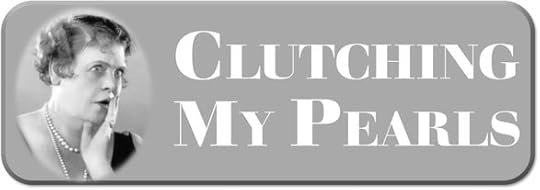 "I think it is fair to say that while no-one is ever going to mistake... Meeke’s writing for great literature, she certainly does keep you turning the pages."
"I think it is fair to say that while no-one is ever going to mistake... Meeke’s writing for great literature, she certainly does keep you turning the pages." – Blogger Liz at A Course of Steady Reading CMP#96 The Cinderella Hero, or, The Blue-Blooded Hunks of Minerva
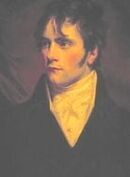 Dashing young man with "Brutus" hairstyle. Here’s the second post in my new occasional series of books that never got a book review when they were published. For the first,
click here.
Dashing young man with "Brutus" hairstyle. Here’s the second post in my new occasional series of books that never got a book review when they were published. For the first,
click here.
This time, I’m reviewing Stratagems Defeated (1811), a four-volume effort by Mrs. Meeke, a prolific authoress who wrote for Minerva Press , a publishing house that specialized in knock-off gothic novels and other sensational fare. It seems her works were a guilty pleasure for the British statesman Thomas Babington Macaulay; he read them avidly, but surreptitiously noted their titles in his journal in Greek.
Mrs. Meeke may have been a stepsister to the successful authors Frances Burney and Sarah Harriet Burney, but she didn’t use the Burney name on her title pages. Instead she published under the pseudonym “Gabrielli,” a name which connotes Italian exoticism. Stratagems Defeated features a wily Sicilian priest and not one, but two people held prisoner by someone trying to force them into marriage, but it is not a gothic novel. Neither is it a tender romance-- the female love interest doesn’t even show up until the final volume, and there are no impediments to keep hero and heroine apart once they meet. In fact, by the time they meet, the hero is the most ridiculously eligible bachelor in the United Kingdom.
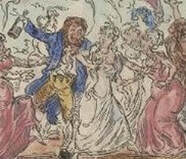 Living large at Vauxhall Gardens Edgar Mortimer is an intelligent and plucky orphan brought up in reduced circumstances. He's handsome, benevolent and level-headed, and before we're done, he inherits three large fortunes and two noble titles. I
earlier wrote
about the importance of death for setting up plots in 18th century novels, especially when the protagonist is an orphan or a foundling; in this case, the authorial slaughter is quite comprehensive on both Edgar's maternal and paternal lines. In the first volume, Meeke sets up a complicated family tree on Edgar’s mother’s side, with step-fathers and step-mothers and half-siblings and a backstory involving impulsive love matches, fraud, bankruptcy, suicide, and parental estrangement. When the dust settles, Edgar is left with his maternal grandmother—whoops, no, she dies too—he's left with a kindly clergyman and a small inheritance, enough to send him to a second-rate boarding school. At eighteen, he starts toiling at a counting-house in London.
Living large at Vauxhall Gardens Edgar Mortimer is an intelligent and plucky orphan brought up in reduced circumstances. He's handsome, benevolent and level-headed, and before we're done, he inherits three large fortunes and two noble titles. I
earlier wrote
about the importance of death for setting up plots in 18th century novels, especially when the protagonist is an orphan or a foundling; in this case, the authorial slaughter is quite comprehensive on both Edgar's maternal and paternal lines. In the first volume, Meeke sets up a complicated family tree on Edgar’s mother’s side, with step-fathers and step-mothers and half-siblings and a backstory involving impulsive love matches, fraud, bankruptcy, suicide, and parental estrangement. When the dust settles, Edgar is left with his maternal grandmother—whoops, no, she dies too—he's left with a kindly clergyman and a small inheritance, enough to send him to a second-rate boarding school. At eighteen, he starts toiling at a counting-house in London.In the first volume we spend all our time with the merchant classes, which I thought was rather unusual since novels of this period are more preoccupied with the wealthy and titled . Meeke gives us a colourful cast of London characters; this first section reminds me more of Dickens than Austen. Are any women engaged in business in Austen, outside of Mrs. Goddard in Emma? In Stratagems Defeated, we meet an avaricious milliner, a gossipy woman who runs an oyster-bar, and several women who competently run inns and “eating-rooms.” As for the men, there are roguish young clerks who live beyond their means, there’s a miserly tobacconist and there are wealthy merchants. There is no condemnation of colonial fortunes ; on the contrary, Mr. Hamilton, a West-India merchant, is one of the good guys. His chief clerk overworks his underlings like a “negro-driver” when the boss is away but apart from that, there is no mention of the slave trade.
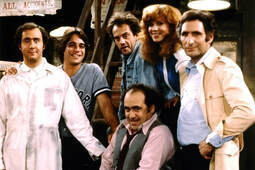 Priggish Hirsch with wacky coworkers These colourful characters tend to overshadow the staid hero. Edgar Mortimer is like the level-headed central character surrounded by eccentrics in a situation comedy, like Judd Hirsch in Taxi. Compared to the other spendthrift, wastrel, clerks in the counting house, he is forbearing and self-controlled, a “picture of perfection.”
Priggish Hirsch with wacky coworkers These colourful characters tend to overshadow the staid hero. Edgar Mortimer is like the level-headed central character surrounded by eccentrics in a situation comedy, like Judd Hirsch in Taxi. Compared to the other spendthrift, wastrel, clerks in the counting house, he is forbearing and self-controlled, a “picture of perfection.”Edgar learns that he is the heir to the Earl of Huntingdon because he is the only surviving male relative on his father's side. (This revelation doesn't come at the end of the novel, but near the end of volume one.) Edgar vows to remain on friendly terms with the kindly clergyman who raised him, the schoolteacher who educated him, and his best friend from the counting-house, but soon realizes that his patrician grandfather intends to manipulate him into dropping his lower-class connections. I assumed that we wouldn’t hear anything more about most of the characters from volume one but that wasn’t the case. Their sub-plots and antics formed the most entertaining part of the novel, even as Meeke adds more dramatic complications involving a new cast of wealthy and nobly-born characters.
Stratagems Defeated should make it abundantly clear that Jane Austen was hardly unique in mentioning the income and financial prospects of her characters. Meeke dwells at length on wills and inheritances, lawsuits and marriage settlements. Here, for example, are the details about the Owensons, who are very minor characters: Mr. Owenson “had a very handsome income, and when he died, he left [his daughter] eighteen thousand pounds, independent of her mother, to whom he left Dunraken Castle, and a thousand a-year, which is also secured to her daughter at her demise: Mrs. Owenson is besides heir-at-law to Mr. Tudor, of Carador House, who cannot, I believe, deprive her of the principal part of his Welch estates, though I have heard it whispered that he might cut off the entail."
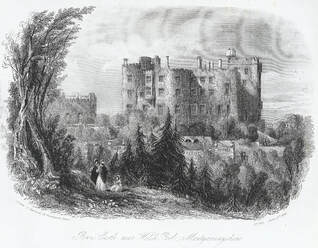 Exotic Welsh atmosphere
Spoilers follow
Exotic Welsh atmosphere
Spoilers follow
The next question to consider is: did Austen or Meeke intend a social message? Some modern scholars contend that Austen was protesting against her patriarchal society and its institutions like primogeniture. If that is so, then Austen has nothing on Meeke. Sense & Sensibility features three sisters who lose out when their wealthy relative dies. In Stratagems Defeated, we have an absolute smorgasbord of villainy:a girl's brother-in-law claims she’s insane and can’t inherit her father’s estate,a corrupt guardian cheats numerous wards and widows out of their inheritances,somebody forges a will to deprive the heirs of their property and money--not once but twice,a man is bribed to marry a girl he doesn’t love so the hero won’t marry her. Some female characters with power and money abuse their power. The milliner cheats her daughters, a sister schemes to send her sister to a convent, the woman running the dormitory for the clerks feeds them scanty, inedible meals.
Or, if the secret message of Northanger Abbey is that marriage and giving birth is often fatal for women, Austen again has nothing on Meeke. None of the younger main characters have a living mother and father; most have neither.
As for the literary features of this book, I was struck by Meeke’s tendency to spin out lengthy sentences with a never-failing stream of commas and semi-colons. We can speculate that her prolix prose style is a reflection of her financial need to churn out three and four volume novels to support herself after her first marriage fell apart. Therefore we get plenty of details. We learn how people are dressed, whether they eat dinner early or fashionably late, how many servants attend them, and all their travel details. As it happens, most of these every-day details were of interest to me, because they're the kind of details that Jane Austen leaves out. The following excerpt gives an idea of the run-on sentences and the level of prosaic detail: the hero and his friend are travelling to Bath by post-chaise, and Edgar's loyal valet Harris is riding on ahead to an inn owned by his family, to have everything in readiness: At Reading [Edgar and John] alighted while the horses were changing, and as it was past two, they ate some cold fowl and ham, and drank a few glasses of sherry, not meaning to dine before they reached Hungerford, which they told Harris, who begged leave to ride forward from thence; the footman could take his place upon the box, and as he was known at Speen-Hill, he should not be required to wait the arrival of the carriage; but might, by this means, have dinner ready against his Lordship’s arrival. Edgar made no objection to his proposal; and as the postillions were well paid, the day cool, and the roads good, they got on very fast. "Playing With Her Readers' Expectations"
Another feature of the novel that surprised me is that the author teases us about introducing a love interest for the hero. I’ve learned from reviews of Meeke’s earlier novels posted at the “Course of Steady Reading” blog that she specialized in putting surprise twists and red herrings in her plots, which often centered around a male Cinderella figure. She “has fun playing with her readers’ expectations…”
In volume 2 of Stratagems Defeated, Edgar and his friend John witness a carriage accident during the afore-mentioned trip to Bath. Meeke uses the accident to:editorialize against reckless driving,create a sub-plot about the theft of some jewels by an acquaintance of Edgar's who coincidentally was in the wrecked carriage, andtease her readers about the non-appearance of the heroine: (Ahem. Speaking of run-on sentences...) By this time the friends had extricated two ladies and an elderly gentleman from the coach.
“'The heroine, of course," cries a female reader, well versed in such novel adventures. We agree that overturns, runaway horses, running streams, and thunder-storms, are often the means of introducing the hero to his fair intended, but we are not so indecorous as to place the future wife of a peer in a stage-coach, therefore, the ladies above-mentioned are by no means concerned in our story, since they were merely returning to Exeter, having been on a visit to a relation in London…
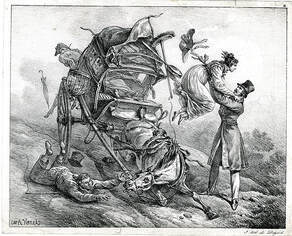 Les accidents de voiture As the story proceeds we meet several young ladies who might be the love interest for the hero, and it turns out they are not. Lady Elinor, the actual future wife for Edgar, doesn’t appear until Volume 4, and he accepts her as his wife not because he was captivated with her at first sight, but on the recommendation of his uncle. Edgar “was certainly not violently in love with her Ladyship, but he was so well convinced that she would make an excellent wife, he meant, as soon as their very short acquaintance had ripened into friendship, to offer himself to her acceptance….” And this, despite the fact that they meet under highly romantic circumstances. I mean, for a meet cute, you can't do better than rescue a girl from French privateer by dueling with the captain and overcoming him just as you both burst into the cabin where she's hiding, can you?
Les accidents de voiture As the story proceeds we meet several young ladies who might be the love interest for the hero, and it turns out they are not. Lady Elinor, the actual future wife for Edgar, doesn’t appear until Volume 4, and he accepts her as his wife not because he was captivated with her at first sight, but on the recommendation of his uncle. Edgar “was certainly not violently in love with her Ladyship, but he was so well convinced that she would make an excellent wife, he meant, as soon as their very short acquaintance had ripened into friendship, to offer himself to her acceptance….” And this, despite the fact that they meet under highly romantic circumstances. I mean, for a meet cute, you can't do better than rescue a girl from French privateer by dueling with the captain and overcoming him just as you both burst into the cabin where she's hiding, can you?Other features of interest: There is more mention of Bonaparte than you'll find in an Austen novel. The characters twice cite Lord Mansfield (the British jurist after whom Mansfield Park is supposedly named), but they don’t mention his ruling against slavery in the United Kingdom, they reference his thoughts on bankruptcy. The hero remarks that he prefers the novel Celia in Search of a Husband to the original best-seller Coelebs in Search of a Wife. Celia was written to cash in on the popularity of Coelebs, so we have one Minerva Press novel (Stratagems Defeated) recommending another Minerva Press novel (Celia). Talk about product placement.The novel's ending is definitely not one of your concise Austen-style summations. Meeke ties up a lot of plot points with her customary detail, and lets us know the fate of every character of note. I read most of Stratagems Defeated with enjoyment, although I began skimming by the fourth volume. I enjoyed it more for the ways it differed from Austen than for any similarities (there is a mention of a Baron D'Arcy). I think it would serve as a fun resource for writers of Regency fiction because of the every day details of life, down to how much to tip the ostler. About Mrs. Meeke
Scholar Simon Macdonald first discovered that the prolific author Mrs. Meeke was Elizabeth Meeke, a Burney step-sister with a colourful marital history. Some references still list “Mrs. Meeke” as “Mary Meeke,” the wife of a minister. Anthony Mandal says Mrs. Meeke was "The most prolific novelist of the romantic era... whose twenty-six original novels and four translations, published over a period of almost thirty years, eclipsed even Sir Walter Scott’s famous output."
The Feminist Companion to Literature in English says that Meeke wrote to a pattern: "She writes grippingly, especially in dramatic or low-life openings... before the nobility appear." In the preamble to her 1802 novel Midnight Weddings, Meeke wrote that novelists had already exhausted all possible plot ideas. She was not “enough within the vortex of fashion to exhibit the follies of its votaries to great advantage,” that is, she did not move in the highest circles of society and could write more convincingly about a tobacco shop than a stately mansion. She also advised aspiring writers to “consult the taste” of their publishers, “for should you fail of meeting with a purchaser [for your novel], that labour you hope will immortalize you is absolutely lost.”
More modern-day Meeke reviews at this blog, "Only a Novel."
Thomas, William. The Journals of Thomas Babington Macaulay Vol 1. United Kingdom, Taylor & Francis, 2021.
Anthony Mandal; "Mrs. Meeke and Minerva: The Mystery of the Marketplace." Eighteenth-Century Life 1 April 2018; 42 (2): 131–151
Published on April 05, 2022 00:00
April 1, 2022
“Fanny found herself obliged to yield”
Note: Last year, I shared a provocative article by noted Austen scholar Lila Proof, which referenced the pioneering work of Dr. Aprille Stulti. To my surprise and gratification, I was subsequently contacted by Dr. Stulti and asked if I would help publicize her exciting research discovery concerning Mansfield Park. Take it away, Dr. Stulti... “Fanny found herself obliged to yield:”
the hermeneutics of the cross and the chain in Mansfield Park
A special guest editorial by Aprille Stulti, Ph.D.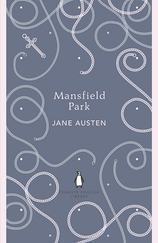 “I cannot look out of my dressing-closet without seeing one farmyard, nor walk in the shrubbery without passing another,” Mary Crawford complains in Mansfield Park. Modern readers have often missed or misunderstood Austen's critical stance on the agricultural revolution and the growth of the British empire. On the surface, we see Mary, a quintessential city girl, surprised to find that she is not able to hire a horse and wagon to transport her harp to the parsonage. But a closer interrogation of the text reveals that Jane Austen was working both with and against Mary Crawford’s seeming ignorance of the realities of agricultural life.
“I cannot look out of my dressing-closet without seeing one farmyard, nor walk in the shrubbery without passing another,” Mary Crawford complains in Mansfield Park. Modern readers have often missed or misunderstood Austen's critical stance on the agricultural revolution and the growth of the British empire. On the surface, we see Mary, a quintessential city girl, surprised to find that she is not able to hire a horse and wagon to transport her harp to the parsonage. But a closer interrogation of the text reveals that Jane Austen was working both with and against Mary Crawford’s seeming ignorance of the realities of agricultural life.
This essay will contend that a close reading of language in Mansfield Park—especially of such seemingly innocuous words such as “survey” and “yield”—reveals Austen’s counter-reaction to agricultural development. Mary Crawford is not merely trying to hire a horse, she is protesting the encroachment of capitalist-based agriculture, which ironically supports the prosperity of her own gentry class. Mary is paradoxically presented as both victim and beneficiary--and finally perpetrator--of imperialist violence.
This essay will explore how key scenes in Mansfield Park, especially those concerning the amber cross and chain, might adumbrate Austen's resistance to her times...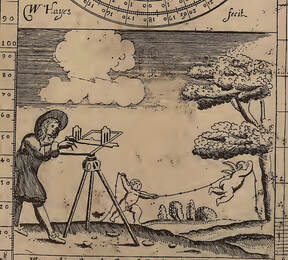 William Leybourn's "The Compleat Surveyor" 1722 "A Full Survey of Her Face"
William Leybourn's "The Compleat Surveyor" 1722 "A Full Survey of Her Face"
Fanny Price, the heroine/hostage of the novel, is associated with surveying immediately upon her arrival at Mansfield Park; we are told that the young Bertram sisters, Maria and Julia, “were soon able to take a full survey of her face and her frock in easy indifference.”
A “survey” of Fanny inevitably associates this vulnerable girl in the readers' mind with the imposition of invisible boundaries on open space. The language that describes Fanny's "yielding" is the language of land surveying, cultivation and conquest. It is not insignificant that farmers spoke of “breaking” the land with a plow. Fanny, too, will be cultivated, transformed into a genteel young lady. She is forced to yield to the will of others, just as farmland yields crops: Repeatedly we are told Fanny is "obliged to yield," or "she must yield."
From this introductory chapter, until we come to the Sotherton episode, the references to surveying and improvement are few. However, the more obliquely Austen refers to surveying, the more important it is to our understanding of the novel. Within that negative space created by Austen, the idea of the imposition of control is pointedly invoked by the name of Dr. Grant, the resident clergyman of Mansfield, and the host to Mary Crawford and her brother Henry. Dr. Grant's name is highly suggestive of grants of land, as from a sovereign to a loyal subject. The Grants, significantly, also busy themselves in extending and improving their property. They have “carried on the garden wall, and made the plantation to shut out the churchyard.” This last comment comes from Mrs. Norris, who is "excessively fond" of "planting and improving."
Surveying returns “as the particular object” when the young people go to Sotherton. “How would Mr. Crawford like, in what manner would he chuse, to take a survey of the grounds?" As the print from "The Compleat Surveyor" (above) indicates, surveying was presented as a benign activity carried out by little cherubs, but Austen deploys Henry's survey of the grounds ironically as a powerful metaphor of the tyranny of land ownership.
Of all of the characters, Henry Crawford is most associated with surveying.And before long, Henry's predatory gaze falls upon Fanny.  Austen's sailor brother Charles gave crosses to Jane and Cassandra The Cross, the Necklace, and the Chain
Austen's sailor brother Charles gave crosses to Jane and Cassandra The Cross, the Necklace, and the Chain
"He loves to be doing," his sister says proudly (and suggestively) of her brother's fondness for "improvements." The oppressive heteronormativity and patriarchy of Henry Crawford’s flirtatious games are intertextually allied to surveying and land use through the material objects of the cross and chain in Chapter 26 of Mansfield Park.
The cross and chain were taken at face value by previous generations of Austen scholars; the amber cross was a symbol of the faith practiced by Fanny Price and her creator, and is especially valued by Fanny as a gift from her beloved brother William. The chain is from Edmund, the man she secretly loves, and it enables her to wear the cross. Austen tells us that Edmund’s chain and cross together are “memorials of the two most beloved of [Fanny’s] heart, those dearest tokens so formed for each other by everything real and imaginary.”
But of course, Austen's intent here is ironic. This truth has been acknowledged in post-colonial Austen scholarship for over thirty years. No-one today supposes that Mansfield Park is a love story, that Fanny could possibly love Edmund, or be proud of her colonizing brother William the sailor.
It is agreed that Austen is subverting something with the cross and chain, but opinions still differ as to exactly what she is subverting. One scholar has argued that the chain represents slavery, and the cross represents the Church of England’s complicity in slavery through its ownership of the Codrington plantations. Others have seen a straightforward sexual inference. Henry Crawford’s ornate necklace “would by no means go through the ring of the cross… it was too large for the purpose.” Edmund’s (presumably smaller) “chain” does fit through. It goes without saying that any object that is longer than it is wide is an encoded sexual symbol, but I intend to extend and contest the existing interpretations.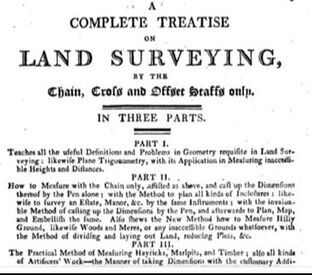 Surveying and Suffering
Surveying and Suffering
In fact, the chain and the cross together are the tools of the land surveyor, as Austen’s contemporaries would have instantly recognized. In encountering Mansfield Park, they would undertand the remarkable similarities with A Complete Treatise on Land Surveying, by the Chain, Cross and Offset Staffs Only (1798), parallels that critics have not previously noted.
The Treatise is described by the Dictionary of National Biography as a “a popular work which went through five editions by 1813,” which means it preceded, was better known, and was more widely-read than Mansfield Park (published in 1814.)
Space permits only a few examples of the intertextual relations between Mansfield Park and the Treatise. The Treatise states (emphasis added): “Suffer your chain leader to go no farther than the nearer side of the ditch... the ditch being the property of the next field.” Paradoxically, Austen camouflages the allusion by never using the word “ditch” in Mansfield Park; she substitutes the word “ha ha.” This interior joke must have afforded much grim and ironic amusement.
“Suffer” in this sense it means “to permit or allow.”* Edmund, significantly, invokes the term suffering in the scene at the chapel at Sotherton when he ostensibly defends public worship over private prayer: “Do you think the minds which are suffered, which are indulged in wanderings in a chapel, would be more collected in a closet?” Edmund wants anyone capable of independent thought to be "collected," preferably in a place where he can keep an eye on them. Even this chilling pronouncement does not shake Fanny’s misguided loyalty to Edmund.
We move from this unsettling scene to one even more distressing: Edmund argues with Mary Crawford as they walk in the wilderness. And what topic, out of all the topics in the world, are they arguing about? The extent of the wilderness! They have both visually surveyed the wilderness, an artificial simulacrum of unimproved land, and disagree about its extent. Mary says “with feminine lawlessness” that the unconquered area is vast, while Edmund “attacks” her and attempts to “dictate” to her, to force her to acknowledge that the remaining uncultivated land “could not have been more than a furlong in length.”
“Oh! I know nothing of your furlongs,” Mary protests, but before long, she herself becomes complicit when she places Henry's necklace, or rather, his chain, around Fanny's "lovely throat" and waves away Fanny's feeble resistance. Thus, Austen inexorably subverts and intertwines the themes of imperialism and resistance; of conqueror and conquered.
The word "survey" is pointedly used by Austen again in the Portsmouth scenes, but only after Henry Crawford has arrived there. Henry and Fanny are walking around the docks from which England's imperialist fleet sailed: "they were very soon joined by a brother lounger of Mr. Price’s, who was come to take his daily survey of how things went on." And of course the imperialist forces "went on" to the four corners of the earth, with Fanny as supine witness. But she is more than a mere witness at Mansfield, that is to say, Man's field , where everything and everyone is brought under patriarchal dominion. We must inevitably see Fanny as complicit “She could say nothing”
We must inevitably see Fanny as complicit “She could say nothing”
One by one, the characters of Mansfield Park fall in line with the agenda of capitalist-based agriculture and imperial exploitation. Austen adds a further layer of bleak irony when she presents Fanny, in chapter 16, becoming a colonizer herself as the colonizer of the East Room: (emphasis added) “[Fanny] had added to her possessions, and spent more of her time there; and having nothing to oppose her, had so naturally and so artlessly worked herself into it, that it was now generally admitted to be hers. The East room, as it had been called ever since Maria Bertram was sixteen, was now considered Fanny’s, almost as decidedly as the white attic.”
It is in the East Room that Edmund surprises Fanny with the gift of “a plain gold chain, perfectly simple and neat” as from one surveying conqueror to another. She is stunned into almost open revolt by the symbolic associations of such a “gift.” She stammers, “I cannot attempt to thank you… thanks are out of the question. I feel much more than I can possibly express.”
But this is the last flicker of resistance. Fanny Price embraces the values of Mansfield Park at the price of her independence, even at the price of her voice. From the middle of Chapter 46 to the end of the novel--11,560 words--Fanny speaks only three times. Some people speak to her, we are told by the narrator that Fanny answers: (“believing herself required to speak”) but we seldom hear Fanny’s own words. She is groomed to silence, acquiescence and complicity.
The ending of Mansfield Park is unparalleled for its concluding irony, in which Austen can be properly understood as meaning the opposite of the actual words on the page. By giving Mansfield Park such an inarticulate and silenced "heroine," Austen shows us that the narrative force of the novel derives from that which cannot be said.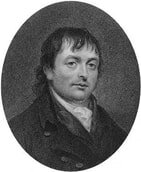 William Davis (1771-1807), author of The Treatise *I would never suggest that a writer of Austen’s subtlety cannot intend more than one meaning, as in the word "suffer." Prior scholarship has established that the “Moor Park” apricot tree--of which Mrs. Norris is so proud--refers not merely to a well-known English estate called "Moor Park,” named after an adjoining moorland, but is an undeniable signifier of the slave trade, because Shakespeare’s Othello was a Moor. Thus apricots are a stark reminder of chattel slavery.
William Davis (1771-1807), author of The Treatise *I would never suggest that a writer of Austen’s subtlety cannot intend more than one meaning, as in the word "suffer." Prior scholarship has established that the “Moor Park” apricot tree--of which Mrs. Norris is so proud--refers not merely to a well-known English estate called "Moor Park,” named after an adjoining moorland, but is an undeniable signifier of the slave trade, because Shakespeare’s Othello was a Moor. Thus apricots are a stark reminder of chattel slavery.
But in addition, the reference to “moors” weaves Mansfield Park together with the Treatise, with its references to "inclosure" and "improvement": “if moors, marshes, bogs, heaths, shallows, pools of water, shrubs or rocks, belong to and adjoin the estate, measure what is improvable first; and if any of the rejected part will admit of improvements, measure and return it as such; the remainder should appear in your map as unprofitable ground.”
The assonance between “moor” and “more” ratifies the connection between agriculture and imperialism. "Moors” are not always "improvable," and if not improvable, are "unprofitable." We instinctively recoil from the capitalism of "profit."
the hermeneutics of the cross and the chain in Mansfield Park
A special guest editorial by Aprille Stulti, Ph.D.
 “I cannot look out of my dressing-closet without seeing one farmyard, nor walk in the shrubbery without passing another,” Mary Crawford complains in Mansfield Park. Modern readers have often missed or misunderstood Austen's critical stance on the agricultural revolution and the growth of the British empire. On the surface, we see Mary, a quintessential city girl, surprised to find that she is not able to hire a horse and wagon to transport her harp to the parsonage. But a closer interrogation of the text reveals that Jane Austen was working both with and against Mary Crawford’s seeming ignorance of the realities of agricultural life.
“I cannot look out of my dressing-closet without seeing one farmyard, nor walk in the shrubbery without passing another,” Mary Crawford complains in Mansfield Park. Modern readers have often missed or misunderstood Austen's critical stance on the agricultural revolution and the growth of the British empire. On the surface, we see Mary, a quintessential city girl, surprised to find that she is not able to hire a horse and wagon to transport her harp to the parsonage. But a closer interrogation of the text reveals that Jane Austen was working both with and against Mary Crawford’s seeming ignorance of the realities of agricultural life.This essay will contend that a close reading of language in Mansfield Park—especially of such seemingly innocuous words such as “survey” and “yield”—reveals Austen’s counter-reaction to agricultural development. Mary Crawford is not merely trying to hire a horse, she is protesting the encroachment of capitalist-based agriculture, which ironically supports the prosperity of her own gentry class. Mary is paradoxically presented as both victim and beneficiary--and finally perpetrator--of imperialist violence.
This essay will explore how key scenes in Mansfield Park, especially those concerning the amber cross and chain, might adumbrate Austen's resistance to her times...
 William Leybourn's "The Compleat Surveyor" 1722 "A Full Survey of Her Face"
William Leybourn's "The Compleat Surveyor" 1722 "A Full Survey of Her Face"Fanny Price, the heroine/hostage of the novel, is associated with surveying immediately upon her arrival at Mansfield Park; we are told that the young Bertram sisters, Maria and Julia, “were soon able to take a full survey of her face and her frock in easy indifference.”
A “survey” of Fanny inevitably associates this vulnerable girl in the readers' mind with the imposition of invisible boundaries on open space. The language that describes Fanny's "yielding" is the language of land surveying, cultivation and conquest. It is not insignificant that farmers spoke of “breaking” the land with a plow. Fanny, too, will be cultivated, transformed into a genteel young lady. She is forced to yield to the will of others, just as farmland yields crops: Repeatedly we are told Fanny is "obliged to yield," or "she must yield."
From this introductory chapter, until we come to the Sotherton episode, the references to surveying and improvement are few. However, the more obliquely Austen refers to surveying, the more important it is to our understanding of the novel. Within that negative space created by Austen, the idea of the imposition of control is pointedly invoked by the name of Dr. Grant, the resident clergyman of Mansfield, and the host to Mary Crawford and her brother Henry. Dr. Grant's name is highly suggestive of grants of land, as from a sovereign to a loyal subject. The Grants, significantly, also busy themselves in extending and improving their property. They have “carried on the garden wall, and made the plantation to shut out the churchyard.” This last comment comes from Mrs. Norris, who is "excessively fond" of "planting and improving."
Surveying returns “as the particular object” when the young people go to Sotherton. “How would Mr. Crawford like, in what manner would he chuse, to take a survey of the grounds?" As the print from "The Compleat Surveyor" (above) indicates, surveying was presented as a benign activity carried out by little cherubs, but Austen deploys Henry's survey of the grounds ironically as a powerful metaphor of the tyranny of land ownership.
Of all of the characters, Henry Crawford is most associated with surveying.And before long, Henry's predatory gaze falls upon Fanny.
 Austen's sailor brother Charles gave crosses to Jane and Cassandra The Cross, the Necklace, and the Chain
Austen's sailor brother Charles gave crosses to Jane and Cassandra The Cross, the Necklace, and the Chain"He loves to be doing," his sister says proudly (and suggestively) of her brother's fondness for "improvements." The oppressive heteronormativity and patriarchy of Henry Crawford’s flirtatious games are intertextually allied to surveying and land use through the material objects of the cross and chain in Chapter 26 of Mansfield Park.
The cross and chain were taken at face value by previous generations of Austen scholars; the amber cross was a symbol of the faith practiced by Fanny Price and her creator, and is especially valued by Fanny as a gift from her beloved brother William. The chain is from Edmund, the man she secretly loves, and it enables her to wear the cross. Austen tells us that Edmund’s chain and cross together are “memorials of the two most beloved of [Fanny’s] heart, those dearest tokens so formed for each other by everything real and imaginary.”
But of course, Austen's intent here is ironic. This truth has been acknowledged in post-colonial Austen scholarship for over thirty years. No-one today supposes that Mansfield Park is a love story, that Fanny could possibly love Edmund, or be proud of her colonizing brother William the sailor.
It is agreed that Austen is subverting something with the cross and chain, but opinions still differ as to exactly what she is subverting. One scholar has argued that the chain represents slavery, and the cross represents the Church of England’s complicity in slavery through its ownership of the Codrington plantations. Others have seen a straightforward sexual inference. Henry Crawford’s ornate necklace “would by no means go through the ring of the cross… it was too large for the purpose.” Edmund’s (presumably smaller) “chain” does fit through. It goes without saying that any object that is longer than it is wide is an encoded sexual symbol, but I intend to extend and contest the existing interpretations.
 Surveying and Suffering
Surveying and Suffering
In fact, the chain and the cross together are the tools of the land surveyor, as Austen’s contemporaries would have instantly recognized. In encountering Mansfield Park, they would undertand the remarkable similarities with A Complete Treatise on Land Surveying, by the Chain, Cross and Offset Staffs Only (1798), parallels that critics have not previously noted.
The Treatise is described by the Dictionary of National Biography as a “a popular work which went through five editions by 1813,” which means it preceded, was better known, and was more widely-read than Mansfield Park (published in 1814.)
Space permits only a few examples of the intertextual relations between Mansfield Park and the Treatise. The Treatise states (emphasis added): “Suffer your chain leader to go no farther than the nearer side of the ditch... the ditch being the property of the next field.” Paradoxically, Austen camouflages the allusion by never using the word “ditch” in Mansfield Park; she substitutes the word “ha ha.” This interior joke must have afforded much grim and ironic amusement.
“Suffer” in this sense it means “to permit or allow.”* Edmund, significantly, invokes the term suffering in the scene at the chapel at Sotherton when he ostensibly defends public worship over private prayer: “Do you think the minds which are suffered, which are indulged in wanderings in a chapel, would be more collected in a closet?” Edmund wants anyone capable of independent thought to be "collected," preferably in a place where he can keep an eye on them. Even this chilling pronouncement does not shake Fanny’s misguided loyalty to Edmund.
We move from this unsettling scene to one even more distressing: Edmund argues with Mary Crawford as they walk in the wilderness. And what topic, out of all the topics in the world, are they arguing about? The extent of the wilderness! They have both visually surveyed the wilderness, an artificial simulacrum of unimproved land, and disagree about its extent. Mary says “with feminine lawlessness” that the unconquered area is vast, while Edmund “attacks” her and attempts to “dictate” to her, to force her to acknowledge that the remaining uncultivated land “could not have been more than a furlong in length.”
“Oh! I know nothing of your furlongs,” Mary protests, but before long, she herself becomes complicit when she places Henry's necklace, or rather, his chain, around Fanny's "lovely throat" and waves away Fanny's feeble resistance. Thus, Austen inexorably subverts and intertwines the themes of imperialism and resistance; of conqueror and conquered.
The word "survey" is pointedly used by Austen again in the Portsmouth scenes, but only after Henry Crawford has arrived there. Henry and Fanny are walking around the docks from which England's imperialist fleet sailed: "they were very soon joined by a brother lounger of Mr. Price’s, who was come to take his daily survey of how things went on." And of course the imperialist forces "went on" to the four corners of the earth, with Fanny as supine witness. But she is more than a mere witness at Mansfield, that is to say, Man's field , where everything and everyone is brought under patriarchal dominion.
 We must inevitably see Fanny as complicit “She could say nothing”
We must inevitably see Fanny as complicit “She could say nothing”One by one, the characters of Mansfield Park fall in line with the agenda of capitalist-based agriculture and imperial exploitation. Austen adds a further layer of bleak irony when she presents Fanny, in chapter 16, becoming a colonizer herself as the colonizer of the East Room: (emphasis added) “[Fanny] had added to her possessions, and spent more of her time there; and having nothing to oppose her, had so naturally and so artlessly worked herself into it, that it was now generally admitted to be hers. The East room, as it had been called ever since Maria Bertram was sixteen, was now considered Fanny’s, almost as decidedly as the white attic.”
It is in the East Room that Edmund surprises Fanny with the gift of “a plain gold chain, perfectly simple and neat” as from one surveying conqueror to another. She is stunned into almost open revolt by the symbolic associations of such a “gift.” She stammers, “I cannot attempt to thank you… thanks are out of the question. I feel much more than I can possibly express.”
But this is the last flicker of resistance. Fanny Price embraces the values of Mansfield Park at the price of her independence, even at the price of her voice. From the middle of Chapter 46 to the end of the novel--11,560 words--Fanny speaks only three times. Some people speak to her, we are told by the narrator that Fanny answers: (“believing herself required to speak”) but we seldom hear Fanny’s own words. She is groomed to silence, acquiescence and complicity.
The ending of Mansfield Park is unparalleled for its concluding irony, in which Austen can be properly understood as meaning the opposite of the actual words on the page. By giving Mansfield Park such an inarticulate and silenced "heroine," Austen shows us that the narrative force of the novel derives from that which cannot be said.
 William Davis (1771-1807), author of The Treatise *I would never suggest that a writer of Austen’s subtlety cannot intend more than one meaning, as in the word "suffer." Prior scholarship has established that the “Moor Park” apricot tree--of which Mrs. Norris is so proud--refers not merely to a well-known English estate called "Moor Park,” named after an adjoining moorland, but is an undeniable signifier of the slave trade, because Shakespeare’s Othello was a Moor. Thus apricots are a stark reminder of chattel slavery.
William Davis (1771-1807), author of The Treatise *I would never suggest that a writer of Austen’s subtlety cannot intend more than one meaning, as in the word "suffer." Prior scholarship has established that the “Moor Park” apricot tree--of which Mrs. Norris is so proud--refers not merely to a well-known English estate called "Moor Park,” named after an adjoining moorland, but is an undeniable signifier of the slave trade, because Shakespeare’s Othello was a Moor. Thus apricots are a stark reminder of chattel slavery.But in addition, the reference to “moors” weaves Mansfield Park together with the Treatise, with its references to "inclosure" and "improvement": “if moors, marshes, bogs, heaths, shallows, pools of water, shrubs or rocks, belong to and adjoin the estate, measure what is improvable first; and if any of the rejected part will admit of improvements, measure and return it as such; the remainder should appear in your map as unprofitable ground.”
The assonance between “moor” and “more” ratifies the connection between agriculture and imperialism. "Moors” are not always "improvable," and if not improvable, are "unprofitable." We instinctively recoil from the capitalism of "profit."
Published on April 01, 2022 00:00
March 28, 2022
CMP#95 Chains of Love
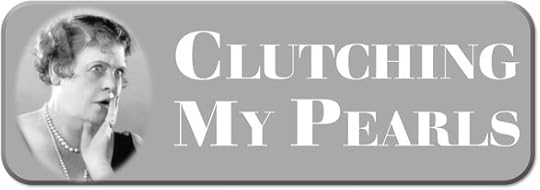 Modern readers who love Jane Austen are eager to find ways to acquit her of being a woman of the long 18th century. Clutching My Pearls is my ongoing blog series about my take on Jane Austen’s beliefs and ideas, as based on her novels. Click here for the first in the series. CMP#95 Chains of Love: did Austen have a potty mouth and a dirty mind?
Modern readers who love Jane Austen are eager to find ways to acquit her of being a woman of the long 18th century. Clutching My Pearls is my ongoing blog series about my take on Jane Austen’s beliefs and ideas, as based on her novels. Click here for the first in the series. CMP#95 Chains of Love: did Austen have a potty mouth and a dirty mind? 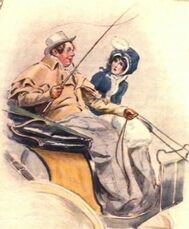 "'It's well hung." "Wait, what?" I’m going to do some heavy-duty pearl-clutching in this post, as I fall back on my fainting couch after having read Jane Austen’s Unbecoming Conjunctions: Subversive Laughter, Embodied History (2005) by Jill Heydt-Stevenson.
"'It's well hung." "Wait, what?" I’m going to do some heavy-duty pearl-clutching in this post, as I fall back on my fainting couch after having read Jane Austen’s Unbecoming Conjunctions: Subversive Laughter, Embodied History (2005) by Jill Heydt-Stevenson.The “subversive laughter” of the title refers to Heydt-Stevenson’s thesis that Austen’s novels, so genteel on the surface, are actually full of humorous sexual imagery which she included not only for its own sake but to subversively undermine the patriarchy.
That is my restatement of her thesis. In her own words, as stated in article in Nineteenth-Century Literature: "Specifically, Austen's bawdy irreverence becomes part of a radical critique of courtship as she closes the gap between fallen women and proper ladies, critiques sensibility's ideological sentimentalization of prostitution, and undermines patriarchal modes of seeing."
Heydt-Stevenson finds many examples of sexual double entendre in Austen. I won't dispute her about Mary Crawford’s “rears and vices,” which sure looks like a sodomy joke, although it bewilders me that Austen would do that, but apparently when Austen uses words like “make” and “tumble" she is hinting at sexual intercourse. (By the way, this post is not exactly g-rated)...
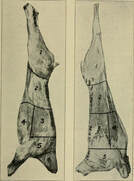 For example, when John Thorpe in Northanger Abbey says his carriage is “well hung” he really means.... Un-hunh, get it? Of course you do. According to Heydt-Stevenson, It would not be possible for a young man to boast about the suspension in his carriage without being understood to also be speaking of large penises.
For example, when John Thorpe in Northanger Abbey says his carriage is “well hung” he really means.... Un-hunh, get it? Of course you do. According to Heydt-Stevenson, It would not be possible for a young man to boast about the suspension in his carriage without being understood to also be speaking of large penises. It's true that during Austen's lifetime, you could purchase bawdy or even explicit material. But what about context? What about taking your intended audience into consideration? When readers of Austen’s time consulted a cookbook and read, “Take a loin of mutton that has been well hung,” did they always snicker? When we hear the phrase “happy ending” used in relation to a fairy tale, it means that the prince is marrying Snow White. When we hear the phrase used in relation to a massage parlor called “The Garden of Eden,” it means something else.
We think of the past as a time when female sexuality was repressed, or it was denied that women had sexual urges at all (with some exceptions, as we see in the 1825 satirical print below which includes a visual double entrendre for "muff.")
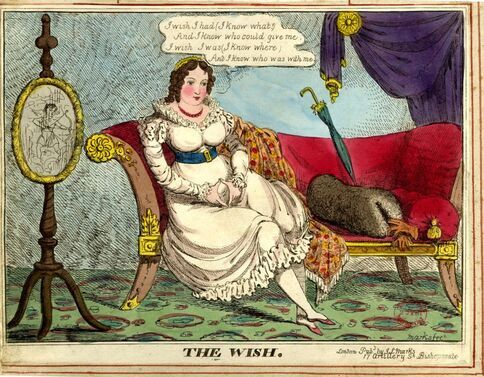 "I wish I had I know what, And I know who could give me, I wish I was I know where, And I know who was with me." However, by asserting that Austen had a potty mouth and a dirty mind, Heydt-Stevenson is not aligning Austen with bold, confident and bawdy women in literature like Chaucer’s Wife of Bath or Shakespeare’s
servant girls
. No--the sexually-charged allusions are really subversive “protests against patriarchal privilege.”
"I wish I had I know what, And I know who could give me, I wish I was I know where, And I know who was with me." However, by asserting that Austen had a potty mouth and a dirty mind, Heydt-Stevenson is not aligning Austen with bold, confident and bawdy women in literature like Chaucer’s Wife of Bath or Shakespeare’s
servant girls
. No--the sexually-charged allusions are really subversive “protests against patriarchal privilege.” According to Heydt-Stevenson, Austen sees courtship is just another word for sexual barter. Austen "exposes the patriarchal/heterosexual world of conventional courtship as a dangerous, violent, and even life-threatening arena for both men and women," in fact. And here you thought you were reading a novel with a happy ending.
To recap: the assertion that Austen was subverting the patriarchy hangs on the first assertion that Austen's novels are filled with double entendres, and I am not convinced by the first assertion. I don’t think it’s beyond dispute, anyway.
 Ironic usage? The Cross, the Necklace and the Chain
Ironic usage? The Cross, the Necklace and the ChainHaving laid out Heydt-Stevenson's thesis, let's move on to compare her interpretation of the amber cross and gold chain in Mansfield Park with the interpretation put forward in Jane Austen: the Secret Radical by Helena Kelly. Elsewhere, I've written about Kelly's assertion that the cross gifted to Fanny by her brother and chain given to her by Edmund represent the Codrington plantations, owned by the Church of England. (Austen uses "chain" to distinguish Edmund's gift from the Crawfords' "necklace." What other word could she have used? "Chain" is the word for the thing people hang crosses around their necks with.) Kelly argues that although Austen tells us Fanny unequivocally loves William and Edmund and she loves her gifts, we, the reader, should be thinking of the hypocrisy of the church, the sins of empire, and the misery of enslaved persons.
Did Austen intend to blend Fanny's tender feelings of affection with the horrors of chattel slavery? Is Austen using the cross and chain as Madonna has irreverently used the crucifix--for its shock value?
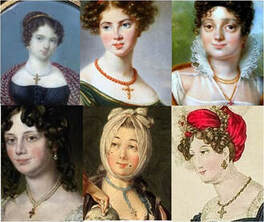 Many of Austen's readers were women who wore crosses and chains as emblems of their faith, not as mere decoration. It's likely that many of those women were gifted their crosses by family members, like a grandparent. Why would the cross and chain represent slavery only inside the pages of Mansfield Park? What were women who wore the cross and chain supposed to think of themselves? Does every cross remind us of the Codrington plantations or only the crosses suspended on a chain? What about crosses on coral beads or strings of pearls? Whenever Ackerman's Repository showed a fashion plate of a lady wearing a cross, was that publication sending a message?
Many of Austen's readers were women who wore crosses and chains as emblems of their faith, not as mere decoration. It's likely that many of those women were gifted their crosses by family members, like a grandparent. Why would the cross and chain represent slavery only inside the pages of Mansfield Park? What were women who wore the cross and chain supposed to think of themselves? Does every cross remind us of the Codrington plantations or only the crosses suspended on a chain? What about crosses on coral beads or strings of pearls? Whenever Ackerman's Repository showed a fashion plate of a lady wearing a cross, was that publication sending a message? And finally, what is the message? By wearing the cross and chain, is Fanny complicit in slavery, or is she protesting it?
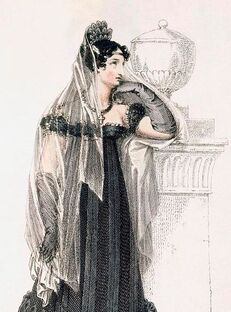 Ostentatious mourning How does the notion that the chain and cross represent something dark and terrible make sense narratively or symbolically? As Austen states in the text, Fanny is delighted to be wearing the cross and chain. She loves the men who gave her the cross and chain. Nothing bad happens to or with the cross and chain. Henry's necklace, on the other hand, makes Fanny uncomfortable--and Austen says so.
Ostentatious mourning How does the notion that the chain and cross represent something dark and terrible make sense narratively or symbolically? As Austen states in the text, Fanny is delighted to be wearing the cross and chain. She loves the men who gave her the cross and chain. Nothing bad happens to or with the cross and chain. Henry's necklace, on the other hand, makes Fanny uncomfortable--and Austen says so. Instead of a slavery connection, the cross and necklace have sexual implications for Heydt-Stevenson (naturally). The amber with which the cross is made is smooth and sensual. In the episode when Fanny consults Mary about her attire for the upcoming ball, Austen lets us know that Fanny is uneasy when Mary offers to give her a necklace. She feels something is not quite right. Fanny reluctantly takes the necklace but discovers that Henry’s necklace is too big to fit through the ring of William’s cross.
Well, that was too easy, right? That’s nothing! Wait until you read Maria Edgeworth’s The Absentee (1812) and get to the part about Lord Colombre “ejaculating over one of Miss Nugent’s gloves.”
Mary later confesses that Henry put her up to it: "It was his own doing entirely, his own thought. I am ashamed to say that it had never entered my head, but I was delighted to act on his proposal for both your sakes.”
The Crawfords were duplicitous because they knew that Fanny's delicacy would prohibit her from receiving a gift from a man. As culpable as they are however, Heydt-Stevenson's description of the episode makes me want to defend them! In her hyperbolic interpretation, Mary's references to Fanny's "lovely throat" are "sly violence," she's a "bawd," (meaning she's grooming Fanny), she "objectifies" Fanny "sexually," Fanny is a "purchasable item," "Henry's chain [necklace, actually] becomes a painfully obvious signifier of entrapment," etc., etc. And is Mansfield Park the only novel which has used the material object of a cross and a chain for narrative purposes? I found another example, a 1811 sentimental short story translated from the French. A long-lost son finds his mother and he gives her a cross and chain, a gift from his wife which was intended for his sister, who he discovers has died. Everybody cries.
Okay, so does this mean that the sister was a slave or a sexual object? Or the wife? Or the mother? Why is nobody pestering deep meanings out of Marcellus, or the Old Cottager?
If popular songs of the last century could use lyrics like "My baby's got me locked up in chains" then surely it was possible that a writer of 200 years ago might use the word "chain" in reference to jewelry without drawing down the assumption that it's a covert protest of chattel slavery or a reference to the commodification of female sexuality. Problematic: "So tighter! Pull them tighter! 'Til I feel that sweet pain. 'Cause these chains of love keep me from going insane." Certainly the word "chain" as a noun and a verb has been used for millenia when discussing slavery, but there are other kinds of chains. As well, I concede that in Austen's time, it was not uncommon to speak of love in terms of slavery. Mary Crawford blithely speaks of her brother glorying in his chains.
But the cross represents the sacrifice and resurrection of Jesus and the promise of salvation for the faithful, or as Heydt-Stevenson puts it, the cross has "spiritual connotations." She notes that "Austen does not emphasize" those connotations. However, a writer crafting novels for the general public in the early 19th century would think twice before publishing something that associates the cross of Christianity with sex. And then they wouldn't do it, because if they did, there would be outrage. Or, if Austen did intend it, she could have thanked her lucky stars that nobody "got" the sexual allusion for two hundred years. I’ve written a lot about the Kelly hypothesis that Austen was a radical. I would sum up Heydt-Stevenson by saying that in my opinion her central assertion-- bawdy humour means Austen is subverting the patriarchy --is poorly supported by argument. There's a lot of vague academic talk about "doubling" and "subverting" and "irony," but basically it is Heydt-Stevenson's assertion that this or that bawdy allusion (supposing Austen intended one) would cast a straight line in the readers' mind to thoughts of the inherent violence of the patriarchy.
Yes, there was plenty of bawdy humour around, especially in Georgian times, but Austen was a lady. Ladies didn't make coarse jokes in public. Nor did Austen take as bleak a view of the relations between the sexes as Heydt-Stevenson ascribes to her. I will not crawl over everything I object to in Heydt-Stevenson's book, but I am going to do a deep dive on two other arguments from Unbecoming Conjunctions in future. Problematic:
Chains, well, I can't break away from these chains
I can't run around / Cause I'm not free
Whoa, oh, these chains of love Won't let me be, yeah Heydt-Stevenson lays out her theories in “‘Slipping into the Ha-Ha’: Bawdy Humor and Body Politics in Jane Austen’s Novels.” Nineteenth-Century Literature 55, no. 3 (2000): 309–39 and in her book, Jane Austen's Unbecoming Conjunctions: Subversive Laughter, Embodied History. United Kingdom, Palgrave Macmillan US, 2016.
The sexualized interpretation of putting a chain through the ring of the cross originated in an article by Alice Chandler: "However, no one to my knowledge has pointed out that the rakish Henry Crawford's chain is too big to fit through the hole in Fanny's cross but that her beloved Edmund's chain slips through quite nicely." Chandler. (2019). "A Pair of Fine Eyes": Jane Austen's Treatment of Sex. Studies in the Novel, 51(1), 36–50.
Kelly, Helena. Jane Austen, the Secret Radical. United States, Alfred A. Knopf, 2017.
Published on March 28, 2022 00:00
March 21, 2022
CMP#94 Seraphina, the lively heroine
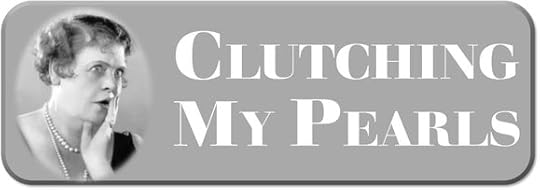 “Here I am once more in this scene of dissipation and vice, and I begin already to find my morals corrupted."
“Here I am once more in this scene of dissipation and vice, and I begin already to find my morals corrupted."-- Jane Austen in a letter from London, August 1796 CMP#94 Better Late Than Never: A Book Review for Seraphina, or A Winter In Town
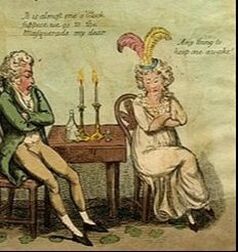 Fashionably late Londoners: "It is almost one o'clock, suppose we go to the Masquerade?" Scholar Anne Hawkins estimates that almost five hundred women brought out novels between 1789 and 1824. One of those women was Jane Austen, whom you might have heard of. Another was Caroline Burney, author of Seraphina, or A Winter in Town (1809), who you probably haven't.
Fashionably late Londoners: "It is almost one o'clock, suppose we go to the Masquerade?" Scholar Anne Hawkins estimates that almost five hundred women brought out novels between 1789 and 1824. One of those women was Jane Austen, whom you might have heard of. Another was Caroline Burney, author of Seraphina, or A Winter in Town (1809), who you probably haven't.One proviso: we can’t be certain that Caroline Burney was a woman. The name is probably a pseudonym, an attempt to cash in on the fame of Frances Burney and her half-sister Sarah Harriet Burney. When Sarah Harriet’s publisher brought out Traits of Nature, he advertised: “'The publisher of this Work thinks it proper to state that Miss Burney is not the Author of a Novel called "Seraphina," published in the year 1809, under the assumed name of Caroline Burney.” Well, Caroline Burney identified as a female, so that should be good enough for our purposes.
In addition, the subtitle A Winter in Town is an echo of the best-selling A Winter in London by Thomas William Surr, which I reviewed here. According to scholar Chris Stevens, Surr’s novel created such a sensation that it briefly inspired its own “microgenre,” the “Season” novel, meaning of course the social season in London, Bath, Brighton, or wherever. These “Season” novels featured wealthy and titled characters behaving badly. Sometimes these portraits were obviously based upon real people, which added to the appeal of the books. London as a sinkhole of vice was such a popular theme in novels that Jane Austen jokes about it in a letter to her sister Cassandra, quoted above.
Some of the older novels I’ve been reading were reviewed in their day, but many came out to no fanfare, and Caroline Burney’s three-volume effort is one of those. So, out of fellow-feeling for these neglected authoresses, I’m instituting an occasional series of book reviews for novels that never got a book review. This post, (I think), is the very first review of Seraphina, or A Winter in Town...
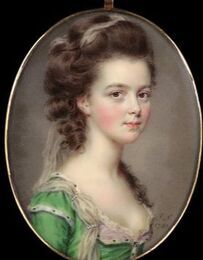 Beautiful blushes: Mrs Russell (nee Cox) by John Smart, 1781 A Lively Heroine
Beautiful blushes: Mrs Russell (nee Cox) by John Smart, 1781 A Lively HeroineWe first meet Seraphina, a beautiful, high-spirited girl, as she carries a basket of clothes to the poor of her quiet Welsh village. She is not a sensitive, weeping, fainting, fluttering, “picture of perfection” heroine but I suppose that's because her situation is not dire. She is a foundling but she has an inheritance. She loves her foster-parents and she’s not particularly curious about how she came to be in their care one mysterious night in London when she was a baby.
Her foster-father Dr. Melbourne resolves to bring her to London to establish her true identity although he's very anxious about exposing his lovely, innocent ward to the depravity of town. His wife assures him: “Seraphina is not of the common cast; her mind is too well stored with elegant resources, and her heart too strictly guarded by delicacy, to yield to the puerile temptations of fashion and folly.”
Seraphina's neighbour Edward Pembroke has been like an older brother to Seraphina. He helped educate her, just as Edmund Bertram educated Fanny Price, and he occasionally rebukes her like Mr. Knightley admonishes Emma. “In all these little contests the mild steadiness of Edward’s temper triumphed over the vivacity of Seraphina’s, and although she would not always acknowledge that she thought him right, her prompt correction of the fault he had censured, evinced the respect she felt for his opinion, and never failed of obtaining for her the approbation she secretly wished for.”
Edward is also very worried about the snares of London. What if Seraphina is caught up in the vortex of dissipation like his sister Sophia? “Oh Seraphina! Happy thoughtless being, how little do you dream of the anxiety that throbs within this bosom upon your account! However, I will warn her of the precipice she stands upon; and if for one moment she can be serious, perhaps the impression may be indelible.”
While Seraphina is quite intelligent in most respects she doesn't realize that Edward is madly in love with her. In fact, she protests, “Edward… is the last person in the world that would think of me in that light; why, he does nothing but find fault with me from morning till night. My lessons were never perfect enough for him…” We must excuse her, however, and blame her obtuseness on the conventions of the romantic novel.
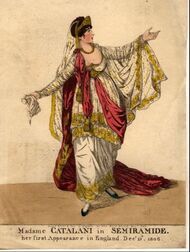 Seraphina and Dr. Melbourne stay with Lord and Lady Avondale (Sophia Pembroke as was) and Seraphina is launched into the fashionable world. Despite the extensive foreshadowing mentioned above, Seraphina is never tempted by the vortex of vice. Our heroine goes to the opera to see the (real life) diva Catalani, but she recoils from the late hours of society and refuses to play cards. She laughingly parries the overblown gallantry of some foppish courtiers. "There was a witchery in her gaiety that was irresistible;
for her wit
so playfully delicate, was pointed without being severe; it had the rare talent of delighting the ear without wounding the heart.”
Seraphina and Dr. Melbourne stay with Lord and Lady Avondale (Sophia Pembroke as was) and Seraphina is launched into the fashionable world. Despite the extensive foreshadowing mentioned above, Seraphina is never tempted by the vortex of vice. Our heroine goes to the opera to see the (real life) diva Catalani, but she recoils from the late hours of society and refuses to play cards. She laughingly parries the overblown gallantry of some foppish courtiers. "There was a witchery in her gaiety that was irresistible;
for her wit
so playfully delicate, was pointed without being severe; it had the rare talent of delighting the ear without wounding the heart.” Her hostess Lady Avondale is addicted to gaming, and takes advantage of Seraphina's naivete by borrowing every guinea she has. Dr. Melbourne takes Lord Avondale to task for not keeping his wife under control. “My dear Dr. Melbourne,” answered Lord Avondale, “what can I do? I should be lampooned and ridiculed in every society, were I to pretend to prescribe rules for the conduct of my wife whilst she keeps within the bounds of decorum.”
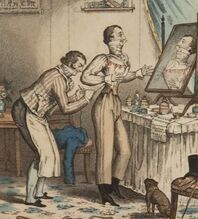 The Dandy's Toilette The Other Characters
The Dandy's Toilette The Other CharactersThere are a number of secondary characters who are not deployed to maximum advantage. They are briefly introduced as recognizable stock characters (the fop! the sprightly sidekick!) but they are given little or nothing to do.
There’s also Edward and Lady Avondale's sister Fanny, a sweet-tempered auxiliary heroine languishing back in Wales. Their sailor brother Robert drops by as well but it’s hard to see why, unless as an excuse to touch upon current events, ie, the war against “Bony.” “There was something so droll and good-humoured in the honest sailor… although Lady Avondale could not help wishing he was a little more refined, yet as he was much talked of for his late exploits at sea, she felt gratified in being pointed out as the sister of the celebrated naval hero.”
Sir Effingham Wilson, another minor character, is an older man who makes himself ridiculous by dressing like a young buck. Seraphina can’t help laughing at him because “as he disclaimed the reverence due to old age by his foppery, my usual inclination to laugh at whatever is ridiculous, will certainly prevail.”
As is often the case with novels of this era, (but seldom with Austen) servants serve as devices for exposition. Old Peter laments how London has turned Sophia Pembroke into the decadent Lady Avondale: “I should never have guess it was our Miss Sophia as was, for lack-a-daisy! how she was painted, if she had blushed ever so, you could not have seed it…” Servants are also essential for furthering or thwarting the evil intentions of their employers. Lady Avondale instructs her lady's maid to get her hands on Seraphina’s jewels so she can exchange them for fakes. Another knock against Lady Avondale’s character, which contemporary audiences would have understood, is that she gossips with and confides in her maid. Seraphina, by contrast, refuses to let her maid gossip about Lady Avondale.
There are a few characters who are more fully drawn. Seraphina’s foster-father Dr. Melbourne is eccentric and humorous at home, but switches to being a severe moralizer in London. A typical reflection: “How much more painful is it to tread the crooked mazes of vice and folly, beneath the roses that adorn that deceitful labyrinth, lurk the serpent’s remorse, repentance, and unpitied anguish, ready to punish with their stings the errors of the thoughtless crew that tread their forbidden haunts.”
There is also a love-rival for Edward in the form of Lord Claredown, a Henry Crawford type. “Numberless innocent unsuspecting hearts had been beguiled of all their happiness long ere they were aware of the danger that awaited them. Several victims had sunk into premature graves, and others had sought revenge for his perfidy [by marrying] the objects of their aversion.” This reminds us of how Maria Bertram married Mr. Rushworth rather than admit that Crawford had scorched her heart. Spoilers Follow
Seraphina is drawn to the sexy and magnetic Claredown until she realizes he’s the man who broke her friend Fanny’s heart, “and he who could trifle with her happiness, shall never endanger mine.”
Lord Claredown is not the only man who is attracted to Seraphina, even before her true identity is known. When Sir Effingham proposes marriage, she is so astonished that she “was unable to answer for some minutes.” When he tries to “construe her silence into an assent to his proposals,” Seraphina “could no longer command herself, but burst into a fit of laughter.” Seraphina is oblivious to the growing evidence that she is the long-lost daughter of Lady Cremona, who died under mysterious circumstances. Almost everywhere she goes in London, someone sees her and gasps in surprise, because she is the perfect image of her late mother. I was reminded of the comic sequence in Kung Fu Panda 3 when Po meets his father. Although Seraphina’s not so good at putting two and two together where her own interests are concerned, she is resolute and courageous when she is abducted by some treacherous Italians (are there any other kind?) who want to replace her, the true heiress, with an imposter. The entire truth about the Cremona mystery comes out through a series of remarkable coincidences and Seraphina's noble parentage is revealed. This is another blow to Edward's hopes for winning her hand, for, in addition to the gap in fortune between them, there is the wide gulf of social class. The first problem is solved at a stroke when a rich uncle with an East Indies fortune makes Edward his heir. (This is a frequently used device in novels of this era). The social gulf remains. Seraphina solves this problem by telling Edward that she loves him. Essentially, she proposes to him, though of course she is blushing madly while doing so. I’m going to have to do another post about the incredible amount of attention that blushes get in the literature of this period.
Edward and Seraphina are married, and other minor characters are also matched in matrimony in a swift summing-up. Vice Confounded and Virtue Rewarded
I’d say three and a half stars out of five for Seraphina. I'm not judging it against great literature but how it stacks up against other novels of the same genre. While the author misses out on some possibilities, and the coincidences are so frequent and improbable as to be comical, the heroine isn’t insipid and the action moves briskly. An 18th-century book reviewer would add that virtue is rewarded and the dissipated characters repent and reform.
Although Seraphina didn't get a book review, we know that it was available at 9 of 22 circulating libraries throughout the kingdom, according to the British Fiction database ,
Novels like A Winter in London may be obscure, but every novel I read teaches me more about the tropes and literary conventions of Austen's time and how she related to them. It also teaches me about how Regency England saw itself, and how novels prescribed ideal conduct for men and women. No doubt reality was far different from novels (this was something that Austen laughed about) but it's interesting to explore the expectations that abounded in the literature of the day. In future, I'll be talking about a different kind of heroine than the lively Seraphina: the "bear and forbear" heroine. I’m always amused when I think of the argument that Pride & Prejudice was a revolutionary novel because of its critical portrayal of the aristocratic Lady Catherine de Bourgh. Novelists of the long 18th century made their bread and butter by criticizing the aristocrats.
Here's an earlier post I wrote about blushing girls and how it is still a thing in China, where I lived for four years.
Lorna Clark quotes Anne Hawkins in "The Literary Legacy of Sarah Harriet Burney." Eighteenth-Century Life 1 April 2018; 42 (2).
Rachel Howard, Domesticating the Novel : Moral-Domestic Fiction, 1820-1834. 2007.
Chris Stevens, "The Season Novel, 1806-1824: A Nineteenth-Century Microgenre." Victoriographies, (2017), 7(2), 81–100.
Published on March 21, 2022 00:00
March 14, 2022
CMP#93 The Right of a Lively Mind
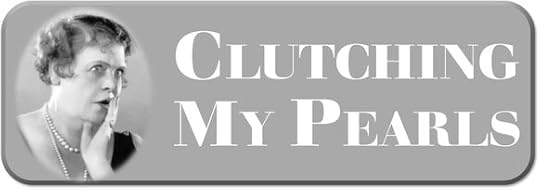 "Your wit and vivacity, I think, must be acceptable to [Lady Catherine de Bourgh], especially when tempered with the silence and respect which her rank will inevitably excite." -- Mr. Collins to Elizabeth Bennet in Pride and Prejudice
CMP#93 The Endowments of Wit and Talent
In earlier posts in my series on Mansfield Park and education, I discussed innate qualities like disposition and understanding. Now I'd like to circle back to the qualities of wit and cleverness. In Fanny Price we see a heroine with no aptitude for wit contrasted with the delightfully witty Mary Crawford. No wonder so many people prefer Mary to Fanny.
"Your wit and vivacity, I think, must be acceptable to [Lady Catherine de Bourgh], especially when tempered with the silence and respect which her rank will inevitably excite." -- Mr. Collins to Elizabeth Bennet in Pride and Prejudice
CMP#93 The Endowments of Wit and Talent
In earlier posts in my series on Mansfield Park and education, I discussed innate qualities like disposition and understanding. Now I'd like to circle back to the qualities of wit and cleverness. In Fanny Price we see a heroine with no aptitude for wit contrasted with the delightfully witty Mary Crawford. No wonder so many people prefer Mary to Fanny.Edmund Bertram, the man they both love, disclaims having any wit: "there is not the least wit in my nature. I am a very matter-of-fact, plain-spoken being, and may blunder on the borders of a repartee for half an hour together without striking it out.”
But their creator Jane Austen was very witty. Sly and subtle jokes abound in her private letters and in her novels, even in the more serious Mansfield Park. Her earlier works are hilarious. Why did such a witty author create Fanny Price, a heroine without wit? Why did she create a heroine so unlike herself?
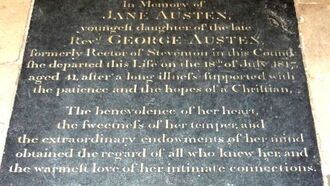 Jane Austen’s memorial plaque at Winchester Cathedral praises the “benevolence of her heart, the sweetness of her temper and the extraordinary endowments of her mind.”
Jane Austen’s memorial plaque at Winchester Cathedral praises the “benevolence of her heart, the sweetness of her temper and the extraordinary endowments of her mind.” Endowment is related to the word dower, as in dowry. Edmund Bertram says regretfully of Mary, "For where shall we find a woman whom Nature had so richly endowed?"
Endowments are gifts from God, and referred to variously as gifts from a Creator, or Providence, or Nature, as in "endowed by their Creator with certain unalienable Rights." Today, we might also use the phrase "God-given talents."
To the innate qualities we've discussed in the previous posts, such as understanding, disposition, and temper, we can add qualities or endowments such as artistic ability and wit. Being witty is allied to being quick in apprehension, or being “quick-sighted.” But not everyone appreciated a witty disposition in Austen's time.
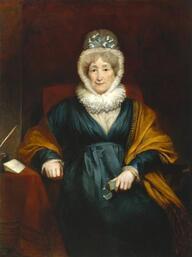 Hannah More (1745--1833) Never Trust a Witty Woman
Hannah More (1745--1833) Never Trust a Witty WomanThe influential writer Hannah More argued at length against wit in females in her Essays on Various Subjects: “[T]hose who actually possess this rare talent, cannot be too abstinent in the use of it. It often makes admirers, but it never makes friends.”
“The fatal fondness for indulging a spirit of ridicule," More explains, "and the injurious and irreparable consequences which sometimes attend the too prompt reply, can never be too seriously or too severely condemned. Not to offend, is the first step toward pleasing. To give pain is as much an offence against humanity, as against good breeding…”
More notes that under the rules of gallantry, a gentleman cannot say unkind things of a lady, but women are not so constrained. “It is this very circumstance which renders them more intolerable. When the arrow is lodged in the heart, it is no relief to him who is wounded to reflect, that the hand which shot him was a fair one.”
Another author who disparaged wit was Arabella Argus. In Ostentation and Liberality (1821), the governess opines that “Wit is the union of cultivated intellect with a lively imagination. Of course, we do not expect to meet it in the young. I believe the talent to be most rare; and even where it does exist, I never heard that it added to the happiness of its possessor, or increased the number of friends.”
Austen was not a fan of Hannah More, or at least she had mixed feelings about her. But I believe Austen thought about, the issues that More raises about wit and raillery.
Austen clearly saw that wit in females was not the prescribed ideal in her society. The idealized heroines of the fiction of Austen's day were not witty. Wit was reserved for the wise-cracking female sidekick, and I’ve got more to say about that in this blog post . In her satirical plan of a novel, Austen lampooned these heroines, who are “faultless… with much tenderness and sentiment, and not the least Wit.” Austen’s hypothetical heroine's “friendship [was] to be sought after by a young woman in the same Neighbourhood, of Talents and Shrewdness… but having a considerable degree of Wit, Heroine shall shrink from the acquaintance."
But many of Austen’s own heroines and heroes are witty, like Elizabeth Bennet and Henry Tilney. Some drop a few dry witticisms, such as Elinor “it is not everyone who has your passion for dead leaves" Dashwood. I think even Edmund Bertram has a subtle, dry wit, as when Fanny worries that the others will crow with triumph when he comes down off his high horse and agrees to join the private theatricals. "They will not have much cause of triumph when they see how infamously I act," Edmund responds.
We are told that Emma Woodhouse is "clever," and she is. But Emma's quip at Miss Bates's expense is a turning point in the novel. Miss Bates says of herself: "I shall be sure to say three dull things as soon as ever I open my mouth, shan’t I?" Emma replies: "Pardon me—but you will be limited as to number—only three at once.” After Mr. Knightley rebukes her, Emma realizes that her retort was cruel and thoughtless. Wit can go over the line.
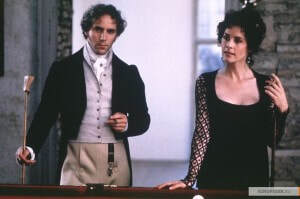 The Crawfords, 1999 movie version The Right of a Lively Mind
The Crawfords, 1999 movie version The Right of a Lively MindIn Mansfield Park, Edmund and Fanny discuss Mary Crawford's wit on several occasions.
Mary had remarked, "What strange creatures brothers are! You would not write to each other but upon the most urgent necessity in the world; and when obliged to take up the pen to say that such a horse is ill, or such a relation dead, it is done in the fewest possible words."
Fanny was peeved at Mary's raillery and later asks Edmund: "And what right had she to suppose that you would not write long letters when you were absent?”
“The right of a lively mind, Fanny," [Edmund answers] "seizing whatever may contribute to its own amusement or that of others; perfectly allowable, when untinctured by ill-humour or roughness; and there is not a shadow of either in the countenance or manner of Miss Crawford: nothing sharp, or loud, or coarse."
(An aside: I've got to take Edmund's side of the argument here, and in addition, I admire how subtly and naturally Austen has shown Fanny as being prejudiced against Mary, and Edmund as prejudiced in her favour. This is human nature which we can all recognize. When we don't like someone, their most minor remark can set our teeth on edge, whereas if we like someone, we overlook any faux pas on their part.)
To resume: Cleverness and wit, especially cynical wit, is thrown away on Fanny. When Henry Crawford decides to flirt with Fanny and "make a hole in her heart," she finds his levity offensive. Then Henry begins to admire Fanny and tries to woo her in earnest. He trims his sails and starts talking up more serious subjects when he’s around her. Edmund notices this: “This would be the way to Fanny’s heart. She was not to be won by all that gallantry and wit and good-nature together could do; or, at least, she would not be won by them nearly so soon, without the assistance of sentiment and feeling, and seriousness on serious subjects.”
But in the end, Edmund Bertram rejects Mary after she shocks him by "coolly canvass[ing]" the best way to overcome the scandal of Maria's elopement with her brother, rather than showing "feminine loathing" at their transgression. Mary's wit blinded Edmund to the fact that she does not subscribe to values and beliefs he regards as fundamental--suddenly, the truth is brought home to him.
Is Fanny's triumph over Mary a message that Austen repudiates wit in females? Do we have any evidence that she struggled with this issue in her own life? Was she ever rebuked for being a smart aleck, or did she ever rebuke herself?
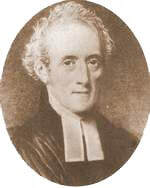 Henry Austen The Extraordinary Endowments of her Mind
Henry Austen The Extraordinary Endowments of her MindNo self-respecting modern scholar of Austen can stroll past the Biographical Notice written by Austen’s brother Henry or the later Memoir by her nephew without aiming a kick at their portrayals of Austen as a sweet-tempered spinster. Her brother Henry insisted that although Austen clearly saw “though the frailties, foibles, and follies of others,” she was invariably kind. He praised her just as Elizabeth praises her sister Jane in Pride and Prejudice. “The affectation of candour is not uncommon; but she had no affectation.” (“Candour,” in this sense, meant kindness and forbearance, refraining from judging or criticizing others.)
Austen’s surviving letters belie this portrait. She made lots of snarky and personal remarks about people. And who knows what else went up in smoke when her sister Cassandra burned the majority of those letters.
As we've seen, mainstream culture, conduct-books and sermons told Austen that being witty was unladylike and unchristian. But on the other hand, she also believed that her talents were God-given talents. Why had God made her so quick-sighted and witty, if he intended for her to deny her very nature?
Her tart remarks in her letters (“I was as civil to them as their bad breath would allow me”) were for Cassandra's eyes alone. As well, she could safely hold her fictional characters up to ridicule. After her death, her brother staunchly denied that any of her brilliantly-crafted fools, such as Mr. Collins or Mrs. Elton, were portraits of real people. "She drew from nature; but, whatever may have been surmised to the contrary, never from individuals." As a writer of fiction myself, I have to smile wickedly at that assertion.
Austen fully recognized that wit could be unkind. In one of her prayers written for family devotion, she wrote: “bring to our knowledge every fault of temper and every evil habit in which we have indulged to the discomfort of our fellow-creature… Have we… willingly given pain to any human being?” In 1814, she counselled her niece about a suitor who was virtuous but not lively: "Wisdom is better than Wit, & in the long run will certainly have the laugh on her side."
Despite any qualms Austen might have had, her own wit was irrepressible. Wit was an inextricable part of her voice from her earliest writings. Her precocious wit brought her praise and attention in the midst of a large and active family. It was who she was, whatever Hannah More or anyone else might have said about it. And her wit flowed forth in her novels and in her characters. Well, apart from some word usage notes below, that about wraps up my "Education and Mansfield Park" blog series. To recap, education is a major and recurring motif in the book, which--in common with many other novels of its time--stressed the dangers of neglecting morals and principles in the education of daughters in favour of showy accomplishments.
I'm far from done with Mansfield Park, and have more to explore concerning Fanny, Maria Bertram, and Mary Crawford, but more from the point of view of the morality and message of Mansfield Park. Oh, and some thoughts about how brilliant the writing is. But first, a segue back to some forgotten heroines of the long eighteenth century and a few other topics. Next post: A heroine whose gaiety was "irresistible; for her wit, so playfully delicate, was pointed without being severe; it had the rare talent of delighting the ear without wounding the heart.”
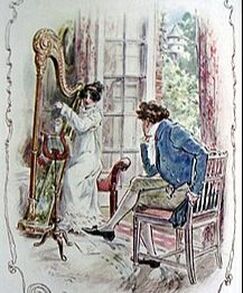 "For where shall we find a woman whom nature had so richly endowed?" Uses of the Term "Wit"
"For where shall we find a woman whom nature had so richly endowed?" Uses of the Term "Wit"Some of Lady Russell's resistance to Anne Elliot's match with Lieutenant Wentworth is due to their clash of personalities. Anne loves Wentworth's “confidence, powerful in its own warmth, and bewitching in the wit which often expressed it; but Lady Russell saw it very differently. His sanguine [unworried] temper... operated very differently on her… Lady Russell had little taste for wit, and of anything approaching to imprudence a horror. She deprecated the connexion in every light.”
“Wit” in the example above must mean something akin to eloquence. It can also mean cleverness. Fanny Dashwood has to think fast to get out of inviting her sisters-in-law to stay with her; on the spur of the moment, she proposes inviting the Steele sisters instead, and her husband agrees. We are told Fanny is “proud of the ready wit that had procured” her “escape” from hosting her poor relations by marriage.
Emma thinks Mr. Elton must be blinded by love for Harriet Smith if he thinks Harriet is clever enough to solve the riddle in his charade-poem: "Thy ready wit the word will soon supply." Emma is blind to the fact that he has really written it for her, not Harriet.
Austen also describes teasing remarks as “wit,” whether or not the people doing the teasing are actually successful in being witty. Miss Bingley directs her spiteful remarks about Elizabeth Bennet at Darcy in the hopes of frightening him off her, ('her wit flowed long') and Sir John Middleton and Mrs. Jennings aim their heavy-handed wit at the Dashwood girls. ("The letter F [was established] as the wittiest letter in the alphabet.")
Candour
It's strange how the meaning of the word "candour" has changed so much. Today is means being open and honest, and relates more to what you say. In the preamble to the Declaration of Independence, it is used in its previous meaning of being open-minded in terms of how you judge others: "let Facts be submitted to a candid world." Scholar Sarah Emsley discusses Austen's "uncharitable" in her letters and that jibe at Mrs. Musgrove's weight in Persuasion in this article. Clutching My Pearls is my ongoing blog series about my take on Jane Austen’s beliefs and ideas, as based on her novels. I’ve also been blogging about now-obscure female authors of the long 18th century. For more, click "Authoresses" on the menu at right. Click here for the first in the series.
Published on March 14, 2022 00:00
March 8, 2022
CMP#92 Education That Stresses Character
 "Nature gave you understanding:—Miss Taylor gave you principles."
"Nature gave you understanding:—Miss Taylor gave you principles."-- Mr. Knightley to Emma Woodhouse in Emma CMP#92 Education That Stresses Character
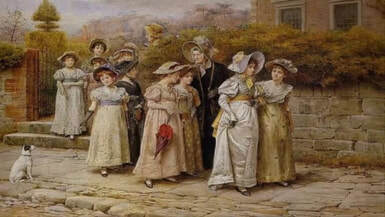 Author William Deresiewicz points out in A Jane Austen Education (2012) that when it came to education for children, Austen's "emphasis… was on character. Not beauty or creativity or even intelligence, but conduct and temperament and the capacity for empathy and feeling."
Author William Deresiewicz points out in A Jane Austen Education (2012) that when it came to education for children, Austen's "emphasis… was on character. Not beauty or creativity or even intelligence, but conduct and temperament and the capacity for empathy and feeling." In the previous posts, we've been looking at the theme of education, especially as it relates to Mansfield Park. In the conversation between the Bertram girls and their Aunt Norris, we see that Maria and Julia have been absorbing facts: “all the metals, semi-metals, planets, and distinguished philosophers,” but Austen informs us that the girls were “entirely deficient in the less common acquirements of self-knowledge, generosity and humility.”
Lady Bertram, their mother, pays no attention to their education.
In contrast, in Jane West's The Advantages of Education (1793), Mrs. Williams takes her daughter out of a fashionable boarding school and starts her on a course of guided reading. This section of the novel gives us an insight into how educated people of Austen's time and social class viewed themselves and their world: “History being most adapted to her purpose… The Grecian and Roman empires furnished various narratives, in which the force of patriotism, the firmness of virtue, and the astonishing greatness to which independence and integrity elevate the human mind, are exemplified. From the story of eastern nations, and the luxurious effeminacy that marked the declining days of Rome, [Mrs. Williams] endeavoured to inspire the attentive girl with an abhorrence of extravagance, corruption and licentious pleasures.
“In the annals of our own nation, she taught her to observe the gradual development of the mental powers, and to trace with nice discernment the varying manners of her countryman, from the rude Briton to the haughty Baron, and from thence to the elegant politeness of the present age…. Maria was led to admire the patience and courage of the untutored savage , the hospitality and spirit of the feudal tyrant, the mistaken piety and mortification of the Monk, and the steadfast firmness of our first reformers.”
Mrs. Williams' tutelage of her daughter helps her develop moral principles, which in turn help her resist the blandishments of a would-be seducer. (For more on this novel, click here). For rest of this article, click "Read More."
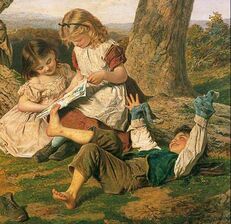 Rational Creatures
Rational CreaturesWhen the Miss Cambridges visit the Aubrey family in Aubrey (1804), they are favourably compared to the other young ladies in the neighbourhood because “they were not only well versed in the works of Pope, Thomson, Gray and Goldsmith…. [Milton’s] Paradise Lost… [and] Shakespeare… but... without the slightest degree of pedantry… [or] the slightest appearance of an affected display of a little learning.”
Mr. Aubrey opines that the best education consists of "Moral reasonings impressed upon the mind, an acquaintance with the appearances of nature, with the history of nations and distinguished persons, with the diversions, customs, and manners of the world, a turn for poetry, a knowledge of languages; even reading and writing well, [which] are surely infinitely more valuable than music and dancing...”
The ultimate aim of reading great literature and studying history and the natural world was to reflect upon one's studies and develop "moral reasonings" in an enlightened mind.
The little foundling Fanny in Fatherless Fanny gets her real moral education not from the headmistresses of her boarding school, but from a good-natured fellow-student: “All the pains bestowed upon Fanny’s education by Miss Bridewell and her assistants, would have availed little, had not the good precepts instilled into her heart by the amiable Emily Barlowe, given solidity to her principles. Piety is a natural feeling of the youthful heart, and only requires some skilful hand to call forth its latent energies, and give them their proper bias.”
We suspect that the governess to the Bertram girls, Miss Lee, might have been like Miss Bridewell, imparting facts without philosophy and accomplishments without personal insights. The results are clear in Maria and Julia Bertram, but Fanny had her cousin Edmund to supply the deficiency. Edmund's "attentions were otherwise of the highest importance in assisting the improvement of her mind... [he] made reading useful by talking to her of what she read, and heightened its attraction by judicious praise." Fanny keeps her own little collection of books In the East Room, including a book about the British embassage to China. We know she loves history, as she is disappointed that the chapel in Sotherton isn't more gothic and evocative of older days. We know she loves Cowper, the poet. We know from her effusions about evergreens and the unreliability of memory that she has been reading natural and moral philosophy.
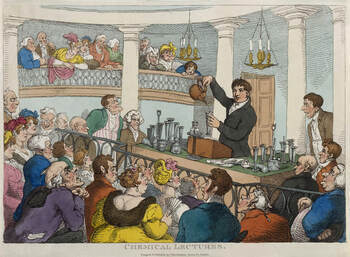 Public lecture, Thomas Rowlandson The Abstruser Sciences
Public lecture, Thomas Rowlandson The Abstruser SciencesAustenites know about Fordyce’s Sermons and other conduct books which also guided parents in the raising of their daughters. Mr. Collins offers to read Fordyce to the Bennet girls and is offended when Lydia is inattentive. We might suppose that Fordyce was all about urging young women to be docile and virtuous. No doubt he was, but you might be surprised to learn that according to scholar Deborah Weiss: “Fordyce urges young women to read history, biography, memoirs and travels, he encourages them to study astronomy and geography and to read natural and moral philosophy; and he permits them to read fables, visions, allegories, drama, poetry, and the best novels and romances.”
The Reverend James Fordyce would have approved of Fanny Price’s reading list. Even people whom we consider to be hopelessly patriarchal like Fordyce acknowledged the benefits for women to develop their rational minds. However, Fordyce urged that “war, commerce, politics… abstract philosophy, and all the abstruser sciences are most properly the province of men." Weiss concludes that “Fordyce displays the conundrum of late eighteenth-century educators who want women to improve their minds, but who fear the possibility of an attendant loss of femininity.”
In Secrets Made Public (1808), Mrs. Fortescue, who actually fancies herself a philosopher, deplores women studying "abstruse subjects." “Do we not see chits, fresh from the boarding-school, who would be puzzled to tell you how many parts of speech there are, run over a long list of barbarous botanical terms, enough to strain the mouth of a North Hollander? Does not the Countess of Woodley profess a knowledge of chemistry, and pretend to write notes on the work of the Bishop of Llandaff?... And why is all this, but because it is the rage of the moment?”
This is also the view of Dr. Hoare and his friend Mr. Ogilvy in A Winter in London. When they take in a public lecture on Galvanism, they are dismayed to see a lot of fashionable women in attendance.
“But are not the scientific pursuits of the present day at least as beneficial to society as the old amusements of working carpets and chair bottoms?” said Doctor Hoare, playing devil's advocate.
“No, they are not.” [Ogilvy responds], “The end of such occupations was to render our homes, a word now almost obsolete, agreeable to their masters; whereas this mania of philosophy has a direct contrary tendency, converting our parlours into chemical laboratories, and our drawing-rooms into debating societies."
And alas, says the narrator, “So loud was the clamour of ladies’ tongues, that the poor lecturer’s learning and eloquence [on the subject of Galvanism] was totally wasted upon the greater part of the assembly.”
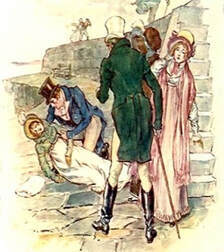 Fortitude and Strength of Character
Fortitude and Strength of CharacterThe hard sciences aside, many novelists agreed that a grounding in history and philosophy provided the foundations for firmness of mind which prepared girls for the vicissitudes of life.
In The Rotchfords (1786), a book for children, Mrs. Rotchford lectures her daughter Kitty that while “Men… ought undoubtedly to support whatever evil may befall them with resolution; but so, my dear child, should women also; and I should be very sorry, indeed, to suppose, that because I was a woman, I must for that reason have no fortitude or firmness of mind. Do not, I beseech you, my child, ever suppose that your sex will excuse you from giving way to weakness, impatience, and folly, for, if once you are possessed with this notion, you will begin to suppose it unnecessary to exert those faculties of the mind which are equally bestowed upon women, as well as men.”
She qualifies this with: “In some instances, indeed the qualifications of boys and girls, men and women, differ wildly, and what in the one sex is absolutely requisite, in the other would appear most ridiculous and disgusting. For instance, there certainly was no impropriety in Charles’s riding on the top of the hay-cart yesterday, and taking off his coat and waistcoat whilst he was assisting in loading it. But would it not have appeared most dreadfully indelicate, if you or your sisters had employed yourselves in the same manner, and pulled off your frocks and stays?”
In Fatherless Fanny, the author opines: “But barren is that mind, whose improvement has been confined to the study of mere ornamental acquirements; the musician, the dancer, or the paintress, however skillful in the various branches, will make but a poor wife, if she be deficient in the more solid and valuable qualities of good sense, good temper, and above all, religion and virtue. The knowledge of languages, though carried to the highest pitch of perfection, can suggest no comfort for affliction, nor strengthen the suffering mind to bear…. (etc., etc., fortitude and resignation, etc.)….”
In Emma, Mr. Knightley thinks Emma's governess Miss Taylor should have been stricter with Emma, in terms of insisting on a "course of steady reading." But he does acknowledge to Emma that "Miss Taylor gave you principles."
When Louisa Musgrove falls off the Cobb in Persuasion, her sister and sister-in-law go into hysterics. Only Anne Elliot keeps her head. It is brought home to Captain Wentworth that character makes a difference: "[T]he scenes on the Cobb and at Captain Harville's had fixed her superiority."
Fanny Price shows strength of character when she refuses to marry a man she does not love or respect. Edmund commends Fanny for being "a woman who, firm as a rock in her own principles, has a gentleness of character so well adapted to recommend them." How does she measure up to the conduct-book ideal? Scholars such as Kenneth L. Molar and Jane Nardin argue that Mansfield Park “makes extensive use of the ideas developed in [Hannah More’s] best-selling manual of advice to parents, Strictures on the Modern System of Female Education, published in 1799.” Was Jane Austen creating a conduct-book miss for a heroine? It looks that way to me, and I'll develop that thought in future posts. Weiss, Deborah. The Female Philosopher and Her Afterlives. Springer International Publishing AG, 2017.
Speaking of "a course of steady reading," I have just discovered a blog by that name which features an exploration of 18th-century literature much as I am doing. Delightful reading.
This post is part of an ongoing series about Mansfield Park and the theme of education in Austen's time. For the first post in the series, click here. For my series about Mansfield Park and the theme of slavery, click here.
Published on March 08, 2022 00:00
February 28, 2022
CMP#91 What Austen said about the West Indies
As background material for my blog series about Mansfield Park, here are all the excerpts from Mansfield Park which touch on the West Indies (Antigua). For all the posts on Mansfield Park, click "Mansfield Park" on the menu on the right. 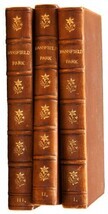 When you isolate all the passages which refer to Sir Thomas and his trip to Antigua, I think it's undeniable that the only emotion expressed by Austen is solicitude for Sir Thomas. There are repeated references to the hardships and dangers he must undergo, and the risks he takes in making the journey there and back again, including the well-known dangers of the climate to Englishmen.
When you isolate all the passages which refer to Sir Thomas and his trip to Antigua, I think it's undeniable that the only emotion expressed by Austen is solicitude for Sir Thomas. There are repeated references to the hardships and dangers he must undergo, and the risks he takes in making the journey there and back again, including the well-known dangers of the climate to Englishmen.
The other references to the West Indies have to do with the losses to the family income.
Further, the "good" people in the novel--Edmund and Fanny--are shown as being concerned for Sir Thomas during his absence. The fact that he is exposed to danger in his voyage home is their chief reason for objecting to staging a play. Other, more flawed, characters, like Lady Bertram and Mr. Yates, are not concerned about him. Mrs. Norris worries about him, but this is because she is dramatizing her own role in the family as chief counselor and director and imagining herself as the tower of strength who consoles the family when he dies.
In the following excerpts, I have italicized some words and passages for emphasis and added some explanatory comments...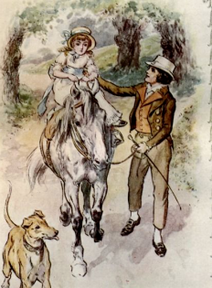 Fanny, Edmund and the old gray pony [Mrs. Norris tells Lady Bertram] “Why, you know, Sir Thomas’s means will be rather straitened if the Antigua estate is to make such poor returns.” “Oh! that will soon be settled. Sir Thomas has been writing about it, I know.”The time was now come when Sir Thomas expected his sister-in-law to claim her share in their niece... and as his own circumstances were rendered less fair than heretofore, by some recent losses on his West India estate, in addition to his eldest son’s extravagance, it became not undesirable to himself to be relieved from the expense of her support, and the obligation of her future provision. Sir Thomas found it expedient to go to Antigua himself, for the better arrangement of his affairs, and he took his eldest son with him, in the hope of detaching him from some bad connexions at home. They left England with the probability of being nearly a twelvemonth absent. The necessity of the measure in a pecuniary light, and the hope of its utility to his son, reconciled Sir Thomas to the effort of quitting the rest of his familyLady Bertram did not at all like to have her husband leave her; but she was not disturbed by any alarm for his safety, or solicitude for his comfort, being one of those persons who think nothing can be dangerous, or difficult, or fatiguing to anybody but themselves.[His daughters are glad that he is leaving; another example of their lack of principle and good character, while Fanny feels guilty that she is not sorry to see him go]. “Sir Thomas, who had done so much for her and her brothers, and who was gone perhaps never to return! that she should see him go without a tear! it was a shameful insensibility.” The earliest intelligence of the travellers’ safe arrival at Antigua, after a favourable voyage, was received; though not before Mrs. Norris had been indulging in very dreadful fears, and trying to make Edmund participate them whenever she could get him alone; and as she depended on being the first person made acquainted with any fatal catastrophe, she had already arranged the manner of breaking it to all the others, when Sir Thomas’s assurances of their both being alive and well made it necessary to lay by her agitation and affectionate preparatory speeches for a while.[Mrs. Norris] was sure Sir Thomas had never intended it: and she must say that, to be [buying a horse] in his absence, and adding to the great expenses of his stable, at a time when a large part of his income was unsettled, seemed to her very unjustifiable.Lady Bertram.... only pleaded against there being any hurry; she only wanted [Edmund] to wait [to buy a horse for Fanny] till Sir Thomas’s return, and then Sir Thomas might settle it all himself. He would be at home in September, and where would be the harm of only waiting till September? "when September came Sir Thomas was still abroad, and without any near prospect of finishing his business. Unfavourable circumstances had suddenly arisen at a moment when he was beginning to turn all his thoughts towards England; and the very great uncertainty in which everything was then involved determined him on sending home his son, and waiting the final arrangement by himself. Tom arrived safely, bringing an excellent account of his father’s health; but to very little purpose, as far as Mrs. Norris was concerned. Sir Thomas’s sending away his son seemed to her so like a parent’s care, under the influence of a foreboding of evil to himself, that she could not help feeling dreadful presentiments...The return of winter engagements, however, was not without its effect; and in the course of their progress, [Mrs. Norris's] mind became so pleasantly occupied in superintending the fortunes of her eldest niece, as tolerably to quiet her nerves. “If poor Sir Thomas were fated never to return, it would be peculiarly consoling to see their dear Maria well married,” she very often thought...
Fanny, Edmund and the old gray pony [Mrs. Norris tells Lady Bertram] “Why, you know, Sir Thomas’s means will be rather straitened if the Antigua estate is to make such poor returns.” “Oh! that will soon be settled. Sir Thomas has been writing about it, I know.”The time was now come when Sir Thomas expected his sister-in-law to claim her share in their niece... and as his own circumstances were rendered less fair than heretofore, by some recent losses on his West India estate, in addition to his eldest son’s extravagance, it became not undesirable to himself to be relieved from the expense of her support, and the obligation of her future provision. Sir Thomas found it expedient to go to Antigua himself, for the better arrangement of his affairs, and he took his eldest son with him, in the hope of detaching him from some bad connexions at home. They left England with the probability of being nearly a twelvemonth absent. The necessity of the measure in a pecuniary light, and the hope of its utility to his son, reconciled Sir Thomas to the effort of quitting the rest of his familyLady Bertram did not at all like to have her husband leave her; but she was not disturbed by any alarm for his safety, or solicitude for his comfort, being one of those persons who think nothing can be dangerous, or difficult, or fatiguing to anybody but themselves.[His daughters are glad that he is leaving; another example of their lack of principle and good character, while Fanny feels guilty that she is not sorry to see him go]. “Sir Thomas, who had done so much for her and her brothers, and who was gone perhaps never to return! that she should see him go without a tear! it was a shameful insensibility.” The earliest intelligence of the travellers’ safe arrival at Antigua, after a favourable voyage, was received; though not before Mrs. Norris had been indulging in very dreadful fears, and trying to make Edmund participate them whenever she could get him alone; and as she depended on being the first person made acquainted with any fatal catastrophe, she had already arranged the manner of breaking it to all the others, when Sir Thomas’s assurances of their both being alive and well made it necessary to lay by her agitation and affectionate preparatory speeches for a while.[Mrs. Norris] was sure Sir Thomas had never intended it: and she must say that, to be [buying a horse] in his absence, and adding to the great expenses of his stable, at a time when a large part of his income was unsettled, seemed to her very unjustifiable.Lady Bertram.... only pleaded against there being any hurry; she only wanted [Edmund] to wait [to buy a horse for Fanny] till Sir Thomas’s return, and then Sir Thomas might settle it all himself. He would be at home in September, and where would be the harm of only waiting till September? "when September came Sir Thomas was still abroad, and without any near prospect of finishing his business. Unfavourable circumstances had suddenly arisen at a moment when he was beginning to turn all his thoughts towards England; and the very great uncertainty in which everything was then involved determined him on sending home his son, and waiting the final arrangement by himself. Tom arrived safely, bringing an excellent account of his father’s health; but to very little purpose, as far as Mrs. Norris was concerned. Sir Thomas’s sending away his son seemed to her so like a parent’s care, under the influence of a foreboding of evil to himself, that she could not help feeling dreadful presentiments...The return of winter engagements, however, was not without its effect; and in the course of their progress, [Mrs. Norris's] mind became so pleasantly occupied in superintending the fortunes of her eldest niece, as tolerably to quiet her nerves. “If poor Sir Thomas were fated never to return, it would be peculiarly consoling to see their dear Maria well married,” she very often thought...
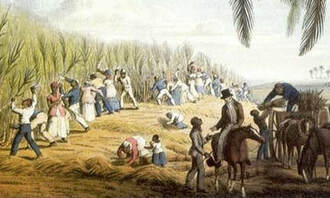 [Sir Thomas] only conditioned that the marriage [of Maria to Mr. Rushworth] should not take place before his return, which he was again looking eagerly forward to. He wrote in April, and had strong hopes of settling everything to his entire satisfaction, and leaving Antigua before the end of the summer.The day at Sotherton, with all its imperfections, afforded the Miss Bertrams much more agreeable feelings than were derived from the letters from Antigua, which soon afterwards reached Mansfield. [Maria and Julia are sorry their father is to return from Antigua.]Mary Crawford to Edmund: "Your father’s return will be a very interesting event." “It will, indeed, after such an absence; an absence not only long, but including so many dangers.” “It will be the forerunner also of other interesting events: your sister’s marriage, and your taking orders.” “Yes.” “Don’t be affronted,” said she, laughing, “but it does put me in mind of some of the old heathen heroes, who, after performing great exploits in a foreign land, offered sacrifices to the gods on their safe return." [Edmund says] “I think it would be very wrong. In a general light, private theatricals are open to some objections, but as we are circumstanced, I must think it would be highly injudicious, and more than injudicious to attempt anything of the kind. It would shew great want of feeling on my father’s account, absent as he is, and in some degree of constant danger."Tom Bertram disagrees: "the expectation of his return must be a very anxious period to my mother; and if we can be the means of amusing that anxiety, and keeping up her spirits for the next few weeks, I shall think our time very well spent, and so, I am sure, will he. It is a very anxious period for her.”[Fanny] could never have been easy in joining a scheme which, considering only her uncle, she must condemn altogether.[Even Mary Crawford understands that Sir Thomas would not approve of play-acting if he knew about it] "Could Sir Thomas look in upon us just now, he would bless himself, for we are rehearsing all over the house."Sir Thomas returns on the evening of a rehearsal for the play, the young people who know him are aghast and guilty, having been caught red-handed doing something they know he would not approve of.while [Mr. Yates and the Crawfords] no longer under any restraint, were giving vent to their feelings of vexation, lamenting over such an unlooked-for premature arrival as a most untoward event, and without mercy wishing poor Sir Thomas had been twice as long on his passage, or were still in Antigua.
[Sir Thomas] only conditioned that the marriage [of Maria to Mr. Rushworth] should not take place before his return, which he was again looking eagerly forward to. He wrote in April, and had strong hopes of settling everything to his entire satisfaction, and leaving Antigua before the end of the summer.The day at Sotherton, with all its imperfections, afforded the Miss Bertrams much more agreeable feelings than were derived from the letters from Antigua, which soon afterwards reached Mansfield. [Maria and Julia are sorry their father is to return from Antigua.]Mary Crawford to Edmund: "Your father’s return will be a very interesting event." “It will, indeed, after such an absence; an absence not only long, but including so many dangers.” “It will be the forerunner also of other interesting events: your sister’s marriage, and your taking orders.” “Yes.” “Don’t be affronted,” said she, laughing, “but it does put me in mind of some of the old heathen heroes, who, after performing great exploits in a foreign land, offered sacrifices to the gods on their safe return." [Edmund says] “I think it would be very wrong. In a general light, private theatricals are open to some objections, but as we are circumstanced, I must think it would be highly injudicious, and more than injudicious to attempt anything of the kind. It would shew great want of feeling on my father’s account, absent as he is, and in some degree of constant danger."Tom Bertram disagrees: "the expectation of his return must be a very anxious period to my mother; and if we can be the means of amusing that anxiety, and keeping up her spirits for the next few weeks, I shall think our time very well spent, and so, I am sure, will he. It is a very anxious period for her.”[Fanny] could never have been easy in joining a scheme which, considering only her uncle, she must condemn altogether.[Even Mary Crawford understands that Sir Thomas would not approve of play-acting if he knew about it] "Could Sir Thomas look in upon us just now, he would bless himself, for we are rehearsing all over the house."Sir Thomas returns on the evening of a rehearsal for the play, the young people who know him are aghast and guilty, having been caught red-handed doing something they know he would not approve of.while [Mr. Yates and the Crawfords] no longer under any restraint, were giving vent to their feelings of vexation, lamenting over such an unlooked-for premature arrival as a most untoward event, and without mercy wishing poor Sir Thomas had been twice as long on his passage, or were still in Antigua.
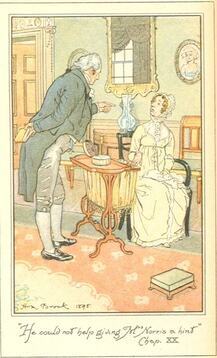 Sir Thomas disappointed in Mrs. Norris [Fanny] on having courage to lift her eyes to his face, she saw that he was grown thinner, and had the burnt, fagged, worn look of fatigue and a hot climate, every tender feeling was increased, and she was miserable in considering how much unsuspected vexation was probably ready to burst on him.Sir Thomas was indeed the life of the party, who at his suggestion now seated themselves round the fire. He had the best right to be the talker; and the delight of his sensations in being again in his own house, in the centre of his family, after such a separation, made him communicative and chatty in a very unusual degree; and he was ready to give every information as to his voyage, and answer every question of his two sons almost before it was put. His business in Antigua [whatever it was] had latterly been prosperously rapid, and he came directly from Liverpool, having had an opportunity of making his passage thither in a private vessel, instead of waiting for the packet; and all the little particulars of his proceedings and events, his arrivals and departures, were most promptly delivered,Mrs. Norris felt herself defrauded of an office on which she had always depended, whether his arrival or his death were to be the thing unfolded; [there had been a real possibility that he would die on this voyage]... in the most interesting moment of his passage to England, when the alarm of a French privateer [pirates] was at the height, she burst through his recital with the proposal of soup.[Austen showing pity for Sir Thomas] Sir Thomas saw all the impropriety of [the play-acting] among such a party, and at such a time, as strongly as his son had ever supposed he must; he felt it too much, indeed, for many words; and having shaken hands with Edmund, meant to try to lose the disagreeable impression, and forget how much he had been forgotten himself as soon as he could.
Sir Thomas disappointed in Mrs. Norris [Fanny] on having courage to lift her eyes to his face, she saw that he was grown thinner, and had the burnt, fagged, worn look of fatigue and a hot climate, every tender feeling was increased, and she was miserable in considering how much unsuspected vexation was probably ready to burst on him.Sir Thomas was indeed the life of the party, who at his suggestion now seated themselves round the fire. He had the best right to be the talker; and the delight of his sensations in being again in his own house, in the centre of his family, after such a separation, made him communicative and chatty in a very unusual degree; and he was ready to give every information as to his voyage, and answer every question of his two sons almost before it was put. His business in Antigua [whatever it was] had latterly been prosperously rapid, and he came directly from Liverpool, having had an opportunity of making his passage thither in a private vessel, instead of waiting for the packet; and all the little particulars of his proceedings and events, his arrivals and departures, were most promptly delivered,Mrs. Norris felt herself defrauded of an office on which she had always depended, whether his arrival or his death were to be the thing unfolded; [there had been a real possibility that he would die on this voyage]... in the most interesting moment of his passage to England, when the alarm of a French privateer [pirates] was at the height, she burst through his recital with the proposal of soup.[Austen showing pity for Sir Thomas] Sir Thomas saw all the impropriety of [the play-acting] among such a party, and at such a time, as strongly as his son had ever supposed he must; he felt it too much, indeed, for many words; and having shaken hands with Edmund, meant to try to lose the disagreeable impression, and forget how much he had been forgotten himself as soon as he could.
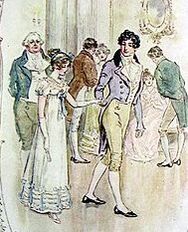 [Fanny says] "I love to hear my uncle talk of the West Indies. [About what, specifically?] I could listen to him for an hour together. It entertains me more than many other things have done; but then I am unlike other people, I dare say.”"Did not you hear me ask him about the slave-trade last night?” “I did—and was in hopes the question would be followed up by others. It would have pleased your uncle to be inquired of farther.” “And I longed to do it—but there was such a dead silence! And while my cousins were sitting by without speaking a word, or seeming at all interested in the subject, I did not like—I thought it would appear as if I wanted to set myself off at their expense, by shewing a curiosity and pleasure in his information which he must wish his own daughters to feel.” [Henry Crawford says] "I think if we had had the disposal of events—if Mansfield Park had had the government of the winds just for a week or two, about the equinox, there would have been a difference. Not that we would have endangered his safety by any tremendous weather—but only by a steady contrary wind, or a calm. I think, Miss Price, we would have indulged ourselves with a week’s calm in the Atlantic at that season.”Sir Thomas, by no means displeased, prolonged the conversation on dancing in general, and was so well engaged in describing the balls of Antigua, and listening to what his nephew could relate of the different modes of dancing which had fallen within his observation Sir Thomas's Plantations
[Fanny says] "I love to hear my uncle talk of the West Indies. [About what, specifically?] I could listen to him for an hour together. It entertains me more than many other things have done; but then I am unlike other people, I dare say.”"Did not you hear me ask him about the slave-trade last night?” “I did—and was in hopes the question would be followed up by others. It would have pleased your uncle to be inquired of farther.” “And I longed to do it—but there was such a dead silence! And while my cousins were sitting by without speaking a word, or seeming at all interested in the subject, I did not like—I thought it would appear as if I wanted to set myself off at their expense, by shewing a curiosity and pleasure in his information which he must wish his own daughters to feel.” [Henry Crawford says] "I think if we had had the disposal of events—if Mansfield Park had had the government of the winds just for a week or two, about the equinox, there would have been a difference. Not that we would have endangered his safety by any tremendous weather—but only by a steady contrary wind, or a calm. I think, Miss Price, we would have indulged ourselves with a week’s calm in the Atlantic at that season.”Sir Thomas, by no means displeased, prolonged the conversation on dancing in general, and was so well engaged in describing the balls of Antigua, and listening to what his nephew could relate of the different modes of dancing which had fallen within his observation Sir Thomas's Plantations
The word "plantation" only appears in Mansfield Park in reference to Sir Thomas's land holdings in Mansfield Park. The word "plantation" is never used in relation to Antigua. Some scholars have pointed to the word "plantation" as being rife with meaning, but in fact it just meant an area that was planted in Austen's time. In these examples, the connotation is either neutral or, in the last two examples, it's associated with positive feelings of nature and happiness.[Mrs. Norris claims that her husband's poor state of health prevented them from improving the parsonage garden] we should have carried on the garden wall, and made the plantation to shut out the churchyard, just as Dr. Grant has done.[After Sir Thomas came back from Antigua he] had to reinstate himself in all the wonted concerns of his Mansfield life: to see his steward and his bailiff... to walk into his stables and his gardens, and nearest plantations; but active and methodical, he had not only done all this before he resumed his seat as master of the house at dinner, he had also set the carpenter to work in pulling down what had been so lately put up in the billiard-room, and given the scene-painter his dismissalon his looking in for a minute in his way from his plantation to his dressing-room, she called him back again, when he had almost closed the door, with “Sir Thomas, stop a moment—I have something to say to you.”What animation, both of body and mind, she had derived from watching the advance of that season which cannot, in spite of its capriciousness, be unlovely, and seeing its increasing beauties from the earliest flowers in the warmest divisions of her aunt’s garden, to the opening of leaves of her uncle’s plantations."Her eye fell everywhere on lawns and plantations of the freshest green; and the trees, though not fully clothed, were in that delightful state when farther beauty is known to be at hand. Other novelists of the time did use the term "plantation" to refer to plantations in the West Indies and to the people who owned them as "plantation-owners" or "planters." Austen doesn't. I am not saying this means that Sir Thomas's business interests in Antigua were not plantations. (Besides, even if he was a merchant or something, this would not absolve him of complicity in the slave trade.) But I think it's another example of how Austen could have been much more explicit than she was about the subject--if she had wanted to be. Plantations and Plot Devices
In all of these excerpts, there is no discussion, no anxiety, no remorse, about enslaved persons. There were pleasurable and interesting aspects to talking about Antigua, for example, the balls held by the plantation-owners. Nothing in the way of condemnation or even doubt. Every reference to "his affairs" and "the estate" and "everything" and "business" in Antigua is as brief and vague and non-committal as could be. As I have written elsewhere, this reticence about calling Sir Thomas's "business" in Antigua a sugar plantation is not because slavery was a taboo topic in Austen's time.
Novelists of the time frequently used the East and West Indies as a place to send characters when they needed them out of the way for plot purposes, as I've mentioned before. As well, colonial fortunes were a handy source of sudden wealth for characters who couldn't marry because of poverty. Austen uses the West Indies as an "exit stage left" for Sir Thomas, but there is no sudden change in anyone's fortunes as a result, or rather, the family is already enriched by the returns from Antigua.
I agree with those scholars who conclude that the brief reference to the slave trade points to the idea that Sir Thomas is an ameliorationist; that is, he doesn't think slavery can be abolished overnight, but the condition of enslaved persons can and should be improved.
Many scholars also contend that Austen is being subtle and ironic. Every time we worry about Sir Thomas, it's really a condemnation of his business in Antigua. When Fanny is happy to see the leaves budding out on the plantations (ie, the trees) when she returns to Mansfield, she's participating in the evil that helps to support the family. The whole thing means the opposite of what Austen says. I disagree, and in the latter part of this article, I explain why.
I conclude that Mansfield Park is not a particularly useful text for exploring the topic of colonial enslavement in the West Indies. Many other 18th-century novels would be more useful in the classroom if you are using the literature of the time to study what British people thought about slavery. Here are two, for starters.
 When you isolate all the passages which refer to Sir Thomas and his trip to Antigua, I think it's undeniable that the only emotion expressed by Austen is solicitude for Sir Thomas. There are repeated references to the hardships and dangers he must undergo, and the risks he takes in making the journey there and back again, including the well-known dangers of the climate to Englishmen.
When you isolate all the passages which refer to Sir Thomas and his trip to Antigua, I think it's undeniable that the only emotion expressed by Austen is solicitude for Sir Thomas. There are repeated references to the hardships and dangers he must undergo, and the risks he takes in making the journey there and back again, including the well-known dangers of the climate to Englishmen. The other references to the West Indies have to do with the losses to the family income.
Further, the "good" people in the novel--Edmund and Fanny--are shown as being concerned for Sir Thomas during his absence. The fact that he is exposed to danger in his voyage home is their chief reason for objecting to staging a play. Other, more flawed, characters, like Lady Bertram and Mr. Yates, are not concerned about him. Mrs. Norris worries about him, but this is because she is dramatizing her own role in the family as chief counselor and director and imagining herself as the tower of strength who consoles the family when he dies.
In the following excerpts, I have italicized some words and passages for emphasis and added some explanatory comments...
 Fanny, Edmund and the old gray pony [Mrs. Norris tells Lady Bertram] “Why, you know, Sir Thomas’s means will be rather straitened if the Antigua estate is to make such poor returns.” “Oh! that will soon be settled. Sir Thomas has been writing about it, I know.”The time was now come when Sir Thomas expected his sister-in-law to claim her share in their niece... and as his own circumstances were rendered less fair than heretofore, by some recent losses on his West India estate, in addition to his eldest son’s extravagance, it became not undesirable to himself to be relieved from the expense of her support, and the obligation of her future provision. Sir Thomas found it expedient to go to Antigua himself, for the better arrangement of his affairs, and he took his eldest son with him, in the hope of detaching him from some bad connexions at home. They left England with the probability of being nearly a twelvemonth absent. The necessity of the measure in a pecuniary light, and the hope of its utility to his son, reconciled Sir Thomas to the effort of quitting the rest of his familyLady Bertram did not at all like to have her husband leave her; but she was not disturbed by any alarm for his safety, or solicitude for his comfort, being one of those persons who think nothing can be dangerous, or difficult, or fatiguing to anybody but themselves.[His daughters are glad that he is leaving; another example of their lack of principle and good character, while Fanny feels guilty that she is not sorry to see him go]. “Sir Thomas, who had done so much for her and her brothers, and who was gone perhaps never to return! that she should see him go without a tear! it was a shameful insensibility.” The earliest intelligence of the travellers’ safe arrival at Antigua, after a favourable voyage, was received; though not before Mrs. Norris had been indulging in very dreadful fears, and trying to make Edmund participate them whenever she could get him alone; and as she depended on being the first person made acquainted with any fatal catastrophe, she had already arranged the manner of breaking it to all the others, when Sir Thomas’s assurances of their both being alive and well made it necessary to lay by her agitation and affectionate preparatory speeches for a while.[Mrs. Norris] was sure Sir Thomas had never intended it: and she must say that, to be [buying a horse] in his absence, and adding to the great expenses of his stable, at a time when a large part of his income was unsettled, seemed to her very unjustifiable.Lady Bertram.... only pleaded against there being any hurry; she only wanted [Edmund] to wait [to buy a horse for Fanny] till Sir Thomas’s return, and then Sir Thomas might settle it all himself. He would be at home in September, and where would be the harm of only waiting till September? "when September came Sir Thomas was still abroad, and without any near prospect of finishing his business. Unfavourable circumstances had suddenly arisen at a moment when he was beginning to turn all his thoughts towards England; and the very great uncertainty in which everything was then involved determined him on sending home his son, and waiting the final arrangement by himself. Tom arrived safely, bringing an excellent account of his father’s health; but to very little purpose, as far as Mrs. Norris was concerned. Sir Thomas’s sending away his son seemed to her so like a parent’s care, under the influence of a foreboding of evil to himself, that she could not help feeling dreadful presentiments...The return of winter engagements, however, was not without its effect; and in the course of their progress, [Mrs. Norris's] mind became so pleasantly occupied in superintending the fortunes of her eldest niece, as tolerably to quiet her nerves. “If poor Sir Thomas were fated never to return, it would be peculiarly consoling to see their dear Maria well married,” she very often thought...
Fanny, Edmund and the old gray pony [Mrs. Norris tells Lady Bertram] “Why, you know, Sir Thomas’s means will be rather straitened if the Antigua estate is to make such poor returns.” “Oh! that will soon be settled. Sir Thomas has been writing about it, I know.”The time was now come when Sir Thomas expected his sister-in-law to claim her share in their niece... and as his own circumstances were rendered less fair than heretofore, by some recent losses on his West India estate, in addition to his eldest son’s extravagance, it became not undesirable to himself to be relieved from the expense of her support, and the obligation of her future provision. Sir Thomas found it expedient to go to Antigua himself, for the better arrangement of his affairs, and he took his eldest son with him, in the hope of detaching him from some bad connexions at home. They left England with the probability of being nearly a twelvemonth absent. The necessity of the measure in a pecuniary light, and the hope of its utility to his son, reconciled Sir Thomas to the effort of quitting the rest of his familyLady Bertram did not at all like to have her husband leave her; but she was not disturbed by any alarm for his safety, or solicitude for his comfort, being one of those persons who think nothing can be dangerous, or difficult, or fatiguing to anybody but themselves.[His daughters are glad that he is leaving; another example of their lack of principle and good character, while Fanny feels guilty that she is not sorry to see him go]. “Sir Thomas, who had done so much for her and her brothers, and who was gone perhaps never to return! that she should see him go without a tear! it was a shameful insensibility.” The earliest intelligence of the travellers’ safe arrival at Antigua, after a favourable voyage, was received; though not before Mrs. Norris had been indulging in very dreadful fears, and trying to make Edmund participate them whenever she could get him alone; and as she depended on being the first person made acquainted with any fatal catastrophe, she had already arranged the manner of breaking it to all the others, when Sir Thomas’s assurances of their both being alive and well made it necessary to lay by her agitation and affectionate preparatory speeches for a while.[Mrs. Norris] was sure Sir Thomas had never intended it: and she must say that, to be [buying a horse] in his absence, and adding to the great expenses of his stable, at a time when a large part of his income was unsettled, seemed to her very unjustifiable.Lady Bertram.... only pleaded against there being any hurry; she only wanted [Edmund] to wait [to buy a horse for Fanny] till Sir Thomas’s return, and then Sir Thomas might settle it all himself. He would be at home in September, and where would be the harm of only waiting till September? "when September came Sir Thomas was still abroad, and without any near prospect of finishing his business. Unfavourable circumstances had suddenly arisen at a moment when he was beginning to turn all his thoughts towards England; and the very great uncertainty in which everything was then involved determined him on sending home his son, and waiting the final arrangement by himself. Tom arrived safely, bringing an excellent account of his father’s health; but to very little purpose, as far as Mrs. Norris was concerned. Sir Thomas’s sending away his son seemed to her so like a parent’s care, under the influence of a foreboding of evil to himself, that she could not help feeling dreadful presentiments...The return of winter engagements, however, was not without its effect; and in the course of their progress, [Mrs. Norris's] mind became so pleasantly occupied in superintending the fortunes of her eldest niece, as tolerably to quiet her nerves. “If poor Sir Thomas were fated never to return, it would be peculiarly consoling to see their dear Maria well married,” she very often thought...
 [Sir Thomas] only conditioned that the marriage [of Maria to Mr. Rushworth] should not take place before his return, which he was again looking eagerly forward to. He wrote in April, and had strong hopes of settling everything to his entire satisfaction, and leaving Antigua before the end of the summer.The day at Sotherton, with all its imperfections, afforded the Miss Bertrams much more agreeable feelings than were derived from the letters from Antigua, which soon afterwards reached Mansfield. [Maria and Julia are sorry their father is to return from Antigua.]Mary Crawford to Edmund: "Your father’s return will be a very interesting event." “It will, indeed, after such an absence; an absence not only long, but including so many dangers.” “It will be the forerunner also of other interesting events: your sister’s marriage, and your taking orders.” “Yes.” “Don’t be affronted,” said she, laughing, “but it does put me in mind of some of the old heathen heroes, who, after performing great exploits in a foreign land, offered sacrifices to the gods on their safe return." [Edmund says] “I think it would be very wrong. In a general light, private theatricals are open to some objections, but as we are circumstanced, I must think it would be highly injudicious, and more than injudicious to attempt anything of the kind. It would shew great want of feeling on my father’s account, absent as he is, and in some degree of constant danger."Tom Bertram disagrees: "the expectation of his return must be a very anxious period to my mother; and if we can be the means of amusing that anxiety, and keeping up her spirits for the next few weeks, I shall think our time very well spent, and so, I am sure, will he. It is a very anxious period for her.”[Fanny] could never have been easy in joining a scheme which, considering only her uncle, she must condemn altogether.[Even Mary Crawford understands that Sir Thomas would not approve of play-acting if he knew about it] "Could Sir Thomas look in upon us just now, he would bless himself, for we are rehearsing all over the house."Sir Thomas returns on the evening of a rehearsal for the play, the young people who know him are aghast and guilty, having been caught red-handed doing something they know he would not approve of.while [Mr. Yates and the Crawfords] no longer under any restraint, were giving vent to their feelings of vexation, lamenting over such an unlooked-for premature arrival as a most untoward event, and without mercy wishing poor Sir Thomas had been twice as long on his passage, or were still in Antigua.
[Sir Thomas] only conditioned that the marriage [of Maria to Mr. Rushworth] should not take place before his return, which he was again looking eagerly forward to. He wrote in April, and had strong hopes of settling everything to his entire satisfaction, and leaving Antigua before the end of the summer.The day at Sotherton, with all its imperfections, afforded the Miss Bertrams much more agreeable feelings than were derived from the letters from Antigua, which soon afterwards reached Mansfield. [Maria and Julia are sorry their father is to return from Antigua.]Mary Crawford to Edmund: "Your father’s return will be a very interesting event." “It will, indeed, after such an absence; an absence not only long, but including so many dangers.” “It will be the forerunner also of other interesting events: your sister’s marriage, and your taking orders.” “Yes.” “Don’t be affronted,” said she, laughing, “but it does put me in mind of some of the old heathen heroes, who, after performing great exploits in a foreign land, offered sacrifices to the gods on their safe return." [Edmund says] “I think it would be very wrong. In a general light, private theatricals are open to some objections, but as we are circumstanced, I must think it would be highly injudicious, and more than injudicious to attempt anything of the kind. It would shew great want of feeling on my father’s account, absent as he is, and in some degree of constant danger."Tom Bertram disagrees: "the expectation of his return must be a very anxious period to my mother; and if we can be the means of amusing that anxiety, and keeping up her spirits for the next few weeks, I shall think our time very well spent, and so, I am sure, will he. It is a very anxious period for her.”[Fanny] could never have been easy in joining a scheme which, considering only her uncle, she must condemn altogether.[Even Mary Crawford understands that Sir Thomas would not approve of play-acting if he knew about it] "Could Sir Thomas look in upon us just now, he would bless himself, for we are rehearsing all over the house."Sir Thomas returns on the evening of a rehearsal for the play, the young people who know him are aghast and guilty, having been caught red-handed doing something they know he would not approve of.while [Mr. Yates and the Crawfords] no longer under any restraint, were giving vent to their feelings of vexation, lamenting over such an unlooked-for premature arrival as a most untoward event, and without mercy wishing poor Sir Thomas had been twice as long on his passage, or were still in Antigua.
 Sir Thomas disappointed in Mrs. Norris [Fanny] on having courage to lift her eyes to his face, she saw that he was grown thinner, and had the burnt, fagged, worn look of fatigue and a hot climate, every tender feeling was increased, and she was miserable in considering how much unsuspected vexation was probably ready to burst on him.Sir Thomas was indeed the life of the party, who at his suggestion now seated themselves round the fire. He had the best right to be the talker; and the delight of his sensations in being again in his own house, in the centre of his family, after such a separation, made him communicative and chatty in a very unusual degree; and he was ready to give every information as to his voyage, and answer every question of his two sons almost before it was put. His business in Antigua [whatever it was] had latterly been prosperously rapid, and he came directly from Liverpool, having had an opportunity of making his passage thither in a private vessel, instead of waiting for the packet; and all the little particulars of his proceedings and events, his arrivals and departures, were most promptly delivered,Mrs. Norris felt herself defrauded of an office on which she had always depended, whether his arrival or his death were to be the thing unfolded; [there had been a real possibility that he would die on this voyage]... in the most interesting moment of his passage to England, when the alarm of a French privateer [pirates] was at the height, she burst through his recital with the proposal of soup.[Austen showing pity for Sir Thomas] Sir Thomas saw all the impropriety of [the play-acting] among such a party, and at such a time, as strongly as his son had ever supposed he must; he felt it too much, indeed, for many words; and having shaken hands with Edmund, meant to try to lose the disagreeable impression, and forget how much he had been forgotten himself as soon as he could.
Sir Thomas disappointed in Mrs. Norris [Fanny] on having courage to lift her eyes to his face, she saw that he was grown thinner, and had the burnt, fagged, worn look of fatigue and a hot climate, every tender feeling was increased, and she was miserable in considering how much unsuspected vexation was probably ready to burst on him.Sir Thomas was indeed the life of the party, who at his suggestion now seated themselves round the fire. He had the best right to be the talker; and the delight of his sensations in being again in his own house, in the centre of his family, after such a separation, made him communicative and chatty in a very unusual degree; and he was ready to give every information as to his voyage, and answer every question of his two sons almost before it was put. His business in Antigua [whatever it was] had latterly been prosperously rapid, and he came directly from Liverpool, having had an opportunity of making his passage thither in a private vessel, instead of waiting for the packet; and all the little particulars of his proceedings and events, his arrivals and departures, were most promptly delivered,Mrs. Norris felt herself defrauded of an office on which she had always depended, whether his arrival or his death were to be the thing unfolded; [there had been a real possibility that he would die on this voyage]... in the most interesting moment of his passage to England, when the alarm of a French privateer [pirates] was at the height, she burst through his recital with the proposal of soup.[Austen showing pity for Sir Thomas] Sir Thomas saw all the impropriety of [the play-acting] among such a party, and at such a time, as strongly as his son had ever supposed he must; he felt it too much, indeed, for many words; and having shaken hands with Edmund, meant to try to lose the disagreeable impression, and forget how much he had been forgotten himself as soon as he could.
 [Fanny says] "I love to hear my uncle talk of the West Indies. [About what, specifically?] I could listen to him for an hour together. It entertains me more than many other things have done; but then I am unlike other people, I dare say.”"Did not you hear me ask him about the slave-trade last night?” “I did—and was in hopes the question would be followed up by others. It would have pleased your uncle to be inquired of farther.” “And I longed to do it—but there was such a dead silence! And while my cousins were sitting by without speaking a word, or seeming at all interested in the subject, I did not like—I thought it would appear as if I wanted to set myself off at their expense, by shewing a curiosity and pleasure in his information which he must wish his own daughters to feel.” [Henry Crawford says] "I think if we had had the disposal of events—if Mansfield Park had had the government of the winds just for a week or two, about the equinox, there would have been a difference. Not that we would have endangered his safety by any tremendous weather—but only by a steady contrary wind, or a calm. I think, Miss Price, we would have indulged ourselves with a week’s calm in the Atlantic at that season.”Sir Thomas, by no means displeased, prolonged the conversation on dancing in general, and was so well engaged in describing the balls of Antigua, and listening to what his nephew could relate of the different modes of dancing which had fallen within his observation Sir Thomas's Plantations
[Fanny says] "I love to hear my uncle talk of the West Indies. [About what, specifically?] I could listen to him for an hour together. It entertains me more than many other things have done; but then I am unlike other people, I dare say.”"Did not you hear me ask him about the slave-trade last night?” “I did—and was in hopes the question would be followed up by others. It would have pleased your uncle to be inquired of farther.” “And I longed to do it—but there was such a dead silence! And while my cousins were sitting by without speaking a word, or seeming at all interested in the subject, I did not like—I thought it would appear as if I wanted to set myself off at their expense, by shewing a curiosity and pleasure in his information which he must wish his own daughters to feel.” [Henry Crawford says] "I think if we had had the disposal of events—if Mansfield Park had had the government of the winds just for a week or two, about the equinox, there would have been a difference. Not that we would have endangered his safety by any tremendous weather—but only by a steady contrary wind, or a calm. I think, Miss Price, we would have indulged ourselves with a week’s calm in the Atlantic at that season.”Sir Thomas, by no means displeased, prolonged the conversation on dancing in general, and was so well engaged in describing the balls of Antigua, and listening to what his nephew could relate of the different modes of dancing which had fallen within his observation Sir Thomas's PlantationsThe word "plantation" only appears in Mansfield Park in reference to Sir Thomas's land holdings in Mansfield Park. The word "plantation" is never used in relation to Antigua. Some scholars have pointed to the word "plantation" as being rife with meaning, but in fact it just meant an area that was planted in Austen's time. In these examples, the connotation is either neutral or, in the last two examples, it's associated with positive feelings of nature and happiness.[Mrs. Norris claims that her husband's poor state of health prevented them from improving the parsonage garden] we should have carried on the garden wall, and made the plantation to shut out the churchyard, just as Dr. Grant has done.[After Sir Thomas came back from Antigua he] had to reinstate himself in all the wonted concerns of his Mansfield life: to see his steward and his bailiff... to walk into his stables and his gardens, and nearest plantations; but active and methodical, he had not only done all this before he resumed his seat as master of the house at dinner, he had also set the carpenter to work in pulling down what had been so lately put up in the billiard-room, and given the scene-painter his dismissalon his looking in for a minute in his way from his plantation to his dressing-room, she called him back again, when he had almost closed the door, with “Sir Thomas, stop a moment—I have something to say to you.”What animation, both of body and mind, she had derived from watching the advance of that season which cannot, in spite of its capriciousness, be unlovely, and seeing its increasing beauties from the earliest flowers in the warmest divisions of her aunt’s garden, to the opening of leaves of her uncle’s plantations."Her eye fell everywhere on lawns and plantations of the freshest green; and the trees, though not fully clothed, were in that delightful state when farther beauty is known to be at hand. Other novelists of the time did use the term "plantation" to refer to plantations in the West Indies and to the people who owned them as "plantation-owners" or "planters." Austen doesn't. I am not saying this means that Sir Thomas's business interests in Antigua were not plantations. (Besides, even if he was a merchant or something, this would not absolve him of complicity in the slave trade.) But I think it's another example of how Austen could have been much more explicit than she was about the subject--if she had wanted to be. Plantations and Plot Devices
In all of these excerpts, there is no discussion, no anxiety, no remorse, about enslaved persons. There were pleasurable and interesting aspects to talking about Antigua, for example, the balls held by the plantation-owners. Nothing in the way of condemnation or even doubt. Every reference to "his affairs" and "the estate" and "everything" and "business" in Antigua is as brief and vague and non-committal as could be. As I have written elsewhere, this reticence about calling Sir Thomas's "business" in Antigua a sugar plantation is not because slavery was a taboo topic in Austen's time.
Novelists of the time frequently used the East and West Indies as a place to send characters when they needed them out of the way for plot purposes, as I've mentioned before. As well, colonial fortunes were a handy source of sudden wealth for characters who couldn't marry because of poverty. Austen uses the West Indies as an "exit stage left" for Sir Thomas, but there is no sudden change in anyone's fortunes as a result, or rather, the family is already enriched by the returns from Antigua.
I agree with those scholars who conclude that the brief reference to the slave trade points to the idea that Sir Thomas is an ameliorationist; that is, he doesn't think slavery can be abolished overnight, but the condition of enslaved persons can and should be improved.
Many scholars also contend that Austen is being subtle and ironic. Every time we worry about Sir Thomas, it's really a condemnation of his business in Antigua. When Fanny is happy to see the leaves budding out on the plantations (ie, the trees) when she returns to Mansfield, she's participating in the evil that helps to support the family. The whole thing means the opposite of what Austen says. I disagree, and in the latter part of this article, I explain why.
I conclude that Mansfield Park is not a particularly useful text for exploring the topic of colonial enslavement in the West Indies. Many other 18th-century novels would be more useful in the classroom if you are using the literature of the time to study what British people thought about slavery. Here are two, for starters.
Published on February 28, 2022 00:00
What Austen said about the West Indies
As background material for my blog series about Mansfield Park, here are all the excerpts from Mansfield Park which touch on the West Indies (Antigua). For all the posts on Mansfield Park, click "Mansfield Park" on the menu on the right.  When you isolate all the passages which refer to Sir Thomas and his trip to Antigua, I think its undeniable that the only emotion expressed by Austen is solicitude for Sir Thomas. There are repeated references to the hardships and danger he must undergo, and the risks he takes in making the journey there and back again, including the well-known dangers of the climate to Englishmen.
When you isolate all the passages which refer to Sir Thomas and his trip to Antigua, I think its undeniable that the only emotion expressed by Austen is solicitude for Sir Thomas. There are repeated references to the hardships and danger he must undergo, and the risks he takes in making the journey there and back again, including the well-known dangers of the climate to Englishmen.
The other references to the West Indies have to do with the losses to the family income.
Further, the "good" people in the novel--Edmund and Fanny--are shown as being concerned for Sir Thomas during his absence. The fact that he is exposed to danger in his voyage home is their chief reason for objecting to staging a play at the time that he is making the voyage. Other, more flawed, characters, like Lady Bertram and Mr. Yates, are not concerned about him.
In the following excerpts, I have italicized some words and passages for emphasis and added some explanatory comments. Fanny, Edmund and the old gray pony [Mrs. Norris tells Lady Bertram] “Why, you know, Sir Thomas’s means will be rather straitened if the Antigua estate is to make such poor returns.” “Oh! that will soon be settled. Sir Thomas has been writing about it, I know.”Sir Thomas found it expedient to go to Antigua himself, for the better arrangement of his affairs, and he took his eldest son with him, in the hope of detaching him from some bad connexions at home. They left England with the probability of being nearly a twelvemonth absent. The necessity of the measure in a pecuniary light, and the hope of its utility to his son, reconciled Sir Thomas to the effort of quitting the rest of his familyLady Bertram did not at all like to have her husband leave her; but she was not disturbed by any alarm for his safety, or solicitude for his comfort, being one of those persons who think nothing can be dangerous, or difficult, or fatiguing to anybody but themselves.[His daughters are glad that he is leaving; another example of their lack of principle and good character, while Fanny feels guilty that she is not sorry to see him go]. “Sir Thomas, who had done so much for her and her brothers, and who was gone perhaps never to return! that she should see him go without a tear! it was a shameful insensibility.” The earliest intelligence of the travellers’ safe arrival at Antigua, after a favourable voyage, was received; though not before Mrs. Norris had been indulging in very dreadful fears, and trying to make Edmund participate them whenever she could get him alone; and as she depended on being the first person made acquainted with any fatal catastrophe, she had already arranged the manner of breaking it to all the others, when Sir Thomas’s assurances of their both being alive and well made it necessary to lay by her agitation and affectionate preparatory speeches for a while.[Mrs. Norris] was sure Sir Thomas had never intended it: and she must say that, to be [buying a horse] in his absence, and adding to the great expenses of his stable, at a time when a large part of his income was unsettled, seemed to her very unjustifiable.Lady Bertram.... only pleaded against there being any hurry; she only wanted [Edmund] to wait [to buy a horse for Fanny] till Sir Thomas’s return, and then Sir Thomas might settle it all himself. He would be at home in September, and where would be the harm of only waiting till September?
Fanny, Edmund and the old gray pony [Mrs. Norris tells Lady Bertram] “Why, you know, Sir Thomas’s means will be rather straitened if the Antigua estate is to make such poor returns.” “Oh! that will soon be settled. Sir Thomas has been writing about it, I know.”Sir Thomas found it expedient to go to Antigua himself, for the better arrangement of his affairs, and he took his eldest son with him, in the hope of detaching him from some bad connexions at home. They left England with the probability of being nearly a twelvemonth absent. The necessity of the measure in a pecuniary light, and the hope of its utility to his son, reconciled Sir Thomas to the effort of quitting the rest of his familyLady Bertram did not at all like to have her husband leave her; but she was not disturbed by any alarm for his safety, or solicitude for his comfort, being one of those persons who think nothing can be dangerous, or difficult, or fatiguing to anybody but themselves.[His daughters are glad that he is leaving; another example of their lack of principle and good character, while Fanny feels guilty that she is not sorry to see him go]. “Sir Thomas, who had done so much for her and her brothers, and who was gone perhaps never to return! that she should see him go without a tear! it was a shameful insensibility.” The earliest intelligence of the travellers’ safe arrival at Antigua, after a favourable voyage, was received; though not before Mrs. Norris had been indulging in very dreadful fears, and trying to make Edmund participate them whenever she could get him alone; and as she depended on being the first person made acquainted with any fatal catastrophe, she had already arranged the manner of breaking it to all the others, when Sir Thomas’s assurances of their both being alive and well made it necessary to lay by her agitation and affectionate preparatory speeches for a while.[Mrs. Norris] was sure Sir Thomas had never intended it: and she must say that, to be [buying a horse] in his absence, and adding to the great expenses of his stable, at a time when a large part of his income was unsettled, seemed to her very unjustifiable.Lady Bertram.... only pleaded against there being any hurry; she only wanted [Edmund] to wait [to buy a horse for Fanny] till Sir Thomas’s return, and then Sir Thomas might settle it all himself. He would be at home in September, and where would be the harm of only waiting till September?
 [Sir Thomas] only conditioned that the marriage [of Maria to Mr. Rushworth] should not take place before his return, which he was again looking eagerly forward to. He wrote in April, and had strong hopes of settling everything [what is "everything? what needs to be "settled"? Austen does not say] to his entire satisfaction, and leaving Antigua before the end of the summer.The day at Sotherton, with all its imperfections, afforded the Miss Bertrams much more agreeable feelings than were derived from the letters from Antigua, which soon afterwards reached Mansfield. [Maria and Julia are sorry their father is to return from Antigua.]Mary Crawford to Edmund: "Your father’s return will be a very interesting event." “It will, indeed, after such an absence; an absence not only long, but including so many dangers.” “It will be the forerunner also of other interesting events: your sister’s marriage, and your taking orders.” “Yes.” “Don’t be affronted,” said she, laughing, “but it does put me in mind of some of the old heathen heroes, who, after performing great exploits in a foreign land, offered sacrifices to the gods on their safe return." while [Mr. Yates and the Crawfords] no longer under any restraint, were giving vent to their feelings of vexation, lamenting over such an unlooked-for premature arrival as a most untoward event, and without mercy wishing poor Sir Thomas had been twice as long on his passage, or were still in Antigua.[Edmund says] “I think it would be very wrong. In a general light, private theatricals are open to some objections, but as we are circumstanced, I must think it would be highly injudicious, and more than injudicious to attempt anything of the kind. It would shew great want of feeling on my father’s account, absent as he is, and in some degree of constant danger.Tom Bertram disagrees: "the expectation of his return must be a very anxious period to my mother; and if we can be the means of amusing that anxiety, and keeping up her spirits for the next few weeks, I shall think our time very well spent, and so, I am sure, will he. It is a very anxious period for her.”[Fanny] could never have been easy in joining a scheme which, considering only her uncle, she must condemn altogether.[Even Mary Crawford understands that Sir Thomas would not approve of play-acting if he knew about it] "Could Sir Thomas look in upon us just now, he would bless himself, for we are rehearsing all over the house."Sir Thomas returns on the evening of a rehearsal for the play, the young people who know him are aghast and guilty, having been caught red-handed doing something they know he would not approve of.
[Sir Thomas] only conditioned that the marriage [of Maria to Mr. Rushworth] should not take place before his return, which he was again looking eagerly forward to. He wrote in April, and had strong hopes of settling everything [what is "everything? what needs to be "settled"? Austen does not say] to his entire satisfaction, and leaving Antigua before the end of the summer.The day at Sotherton, with all its imperfections, afforded the Miss Bertrams much more agreeable feelings than were derived from the letters from Antigua, which soon afterwards reached Mansfield. [Maria and Julia are sorry their father is to return from Antigua.]Mary Crawford to Edmund: "Your father’s return will be a very interesting event." “It will, indeed, after such an absence; an absence not only long, but including so many dangers.” “It will be the forerunner also of other interesting events: your sister’s marriage, and your taking orders.” “Yes.” “Don’t be affronted,” said she, laughing, “but it does put me in mind of some of the old heathen heroes, who, after performing great exploits in a foreign land, offered sacrifices to the gods on their safe return." while [Mr. Yates and the Crawfords] no longer under any restraint, were giving vent to their feelings of vexation, lamenting over such an unlooked-for premature arrival as a most untoward event, and without mercy wishing poor Sir Thomas had been twice as long on his passage, or were still in Antigua.[Edmund says] “I think it would be very wrong. In a general light, private theatricals are open to some objections, but as we are circumstanced, I must think it would be highly injudicious, and more than injudicious to attempt anything of the kind. It would shew great want of feeling on my father’s account, absent as he is, and in some degree of constant danger.Tom Bertram disagrees: "the expectation of his return must be a very anxious period to my mother; and if we can be the means of amusing that anxiety, and keeping up her spirits for the next few weeks, I shall think our time very well spent, and so, I am sure, will he. It is a very anxious period for her.”[Fanny] could never have been easy in joining a scheme which, considering only her uncle, she must condemn altogether.[Even Mary Crawford understands that Sir Thomas would not approve of play-acting if he knew about it] "Could Sir Thomas look in upon us just now, he would bless himself, for we are rehearsing all over the house."Sir Thomas returns on the evening of a rehearsal for the play, the young people who know him are aghast and guilty, having been caught red-handed doing something they know he would not approve of.
 Sir Thomas disappointed in Mrs. Norris [Fanny] on having courage to lift her eyes to his face, she saw that he was grown thinner, and had the burnt, fagged, worn look of fatigue and a hot climate, every tender feeling was increased, and she was miserable in considering how much unsuspected vexation was probably ready to burst on him.Sir Thomas was indeed the life of the party, who at his suggestion now seated themselves round the fire. He had the best right to be the talker; and the delight of his sensations in being again in his own house, in the centre of his family, after such a separation, made him communicative and chatty in a very unusual degree; and he was ready to give every information as to his voyage, and answer every question of his two sons almost before it was put. His business in Antigua [whatever it was] had latterly been prosperously rapid, and he came directly from Liverpool, having had an opportunity of making his passage thither in a private vessel, instead of waiting for the packet; and all the little particulars of his proceedings and events, his arrivals and departures, were most promptly delivered,Mrs. Norris felt herself defrauded of an office on which she had always depended, whether his arrival or his death were to be the thing unfolded; [there had been a real chance that he would die on this voyage]... in the most interesting moment of his passage to England, when the alarm of a French privateer [pirates] was at the height, she burst through his recital with the proposal of soup.[Austen showing pity for Sir Thomas] Sir Thomas saw all the impropriety of [the play-acting] among such a party, and at such a time, as strongly as his son had ever supposed he must; he felt it too much, indeed, for many words; and having shaken hands with Edmund, meant to try to lose the disagreeable impression, and forget how much he had been forgotten himself as soon as he could.
Sir Thomas disappointed in Mrs. Norris [Fanny] on having courage to lift her eyes to his face, she saw that he was grown thinner, and had the burnt, fagged, worn look of fatigue and a hot climate, every tender feeling was increased, and she was miserable in considering how much unsuspected vexation was probably ready to burst on him.Sir Thomas was indeed the life of the party, who at his suggestion now seated themselves round the fire. He had the best right to be the talker; and the delight of his sensations in being again in his own house, in the centre of his family, after such a separation, made him communicative and chatty in a very unusual degree; and he was ready to give every information as to his voyage, and answer every question of his two sons almost before it was put. His business in Antigua [whatever it was] had latterly been prosperously rapid, and he came directly from Liverpool, having had an opportunity of making his passage thither in a private vessel, instead of waiting for the packet; and all the little particulars of his proceedings and events, his arrivals and departures, were most promptly delivered,Mrs. Norris felt herself defrauded of an office on which she had always depended, whether his arrival or his death were to be the thing unfolded; [there had been a real chance that he would die on this voyage]... in the most interesting moment of his passage to England, when the alarm of a French privateer [pirates] was at the height, she burst through his recital with the proposal of soup.[Austen showing pity for Sir Thomas] Sir Thomas saw all the impropriety of [the play-acting] among such a party, and at such a time, as strongly as his son had ever supposed he must; he felt it too much, indeed, for many words; and having shaken hands with Edmund, meant to try to lose the disagreeable impression, and forget how much he had been forgotten himself as soon as he could.
 [Fanny says] "I love to hear my uncle talk of the West Indies. [About what, specifically?] I could listen to him for an hour together. It entertains me more than many other things have done; but then I am unlike other people, I dare say.”"Did not you hear me ask him about the slave-trade last night?” “I did—and was in hopes the question would be followed up by others. It would have pleased your uncle to be inquired of farther.” “And I longed to do it—but there was such a dead silence! And while my cousins were sitting by without speaking a word, or seeming at all interested in the subject, I did not like—I thought it would appear as if I wanted to set myself off at their expense, by shewing a curiosity and pleasure in his information which he must wish his own daughters to feel.” [Henry Crawford says] "I think if we had had the disposal of events—if Mansfield Park had had the government of the winds just for a week or two, about the equinox, there would have been a difference. Not that we would have endangered his safety by any tremendous weather—but only by a steady contrary wind, or a calm. I think, Miss Price, we would have indulged ourselves with a week’s calm in the Atlantic at that season.”Sir Thomas, by no means displeased, prolonged the conversation on dancing in general, and was so well engaged in describing the balls of Antigua, and listening to what his nephew could relate of the different modes of dancing which had fallen within his observation There is no discussion, no anxiety, no remorse, about enslaved persons. I agree with those scholars who conclude that the brief reference to the slave trade points to the idea that Sir Thomas is an ameliorationist; that is, he doesn't think slavery can be abolished overnight, but the condition of enslaved persons can and should be improved. As I have written elsewhere, this is not because slavery was a taboo topic in Austen's time.
[Fanny says] "I love to hear my uncle talk of the West Indies. [About what, specifically?] I could listen to him for an hour together. It entertains me more than many other things have done; but then I am unlike other people, I dare say.”"Did not you hear me ask him about the slave-trade last night?” “I did—and was in hopes the question would be followed up by others. It would have pleased your uncle to be inquired of farther.” “And I longed to do it—but there was such a dead silence! And while my cousins were sitting by without speaking a word, or seeming at all interested in the subject, I did not like—I thought it would appear as if I wanted to set myself off at their expense, by shewing a curiosity and pleasure in his information which he must wish his own daughters to feel.” [Henry Crawford says] "I think if we had had the disposal of events—if Mansfield Park had had the government of the winds just for a week or two, about the equinox, there would have been a difference. Not that we would have endangered his safety by any tremendous weather—but only by a steady contrary wind, or a calm. I think, Miss Price, we would have indulged ourselves with a week’s calm in the Atlantic at that season.”Sir Thomas, by no means displeased, prolonged the conversation on dancing in general, and was so well engaged in describing the balls of Antigua, and listening to what his nephew could relate of the different modes of dancing which had fallen within his observation There is no discussion, no anxiety, no remorse, about enslaved persons. I agree with those scholars who conclude that the brief reference to the slave trade points to the idea that Sir Thomas is an ameliorationist; that is, he doesn't think slavery can be abolished overnight, but the condition of enslaved persons can and should be improved. As I have written elsewhere, this is not because slavery was a taboo topic in Austen's time.
I conclude that Mansfield Park is not a particularly useful text for exploring the topic. Many other 18th-century novels would be more useful in the classroom if you are using the literature of the time to study what British people thought about slavery. Here are two, for starters.
 When you isolate all the passages which refer to Sir Thomas and his trip to Antigua, I think its undeniable that the only emotion expressed by Austen is solicitude for Sir Thomas. There are repeated references to the hardships and danger he must undergo, and the risks he takes in making the journey there and back again, including the well-known dangers of the climate to Englishmen.
When you isolate all the passages which refer to Sir Thomas and his trip to Antigua, I think its undeniable that the only emotion expressed by Austen is solicitude for Sir Thomas. There are repeated references to the hardships and danger he must undergo, and the risks he takes in making the journey there and back again, including the well-known dangers of the climate to Englishmen. The other references to the West Indies have to do with the losses to the family income.
Further, the "good" people in the novel--Edmund and Fanny--are shown as being concerned for Sir Thomas during his absence. The fact that he is exposed to danger in his voyage home is their chief reason for objecting to staging a play at the time that he is making the voyage. Other, more flawed, characters, like Lady Bertram and Mr. Yates, are not concerned about him.
In the following excerpts, I have italicized some words and passages for emphasis and added some explanatory comments.
 Fanny, Edmund and the old gray pony [Mrs. Norris tells Lady Bertram] “Why, you know, Sir Thomas’s means will be rather straitened if the Antigua estate is to make such poor returns.” “Oh! that will soon be settled. Sir Thomas has been writing about it, I know.”Sir Thomas found it expedient to go to Antigua himself, for the better arrangement of his affairs, and he took his eldest son with him, in the hope of detaching him from some bad connexions at home. They left England with the probability of being nearly a twelvemonth absent. The necessity of the measure in a pecuniary light, and the hope of its utility to his son, reconciled Sir Thomas to the effort of quitting the rest of his familyLady Bertram did not at all like to have her husband leave her; but she was not disturbed by any alarm for his safety, or solicitude for his comfort, being one of those persons who think nothing can be dangerous, or difficult, or fatiguing to anybody but themselves.[His daughters are glad that he is leaving; another example of their lack of principle and good character, while Fanny feels guilty that she is not sorry to see him go]. “Sir Thomas, who had done so much for her and her brothers, and who was gone perhaps never to return! that she should see him go without a tear! it was a shameful insensibility.” The earliest intelligence of the travellers’ safe arrival at Antigua, after a favourable voyage, was received; though not before Mrs. Norris had been indulging in very dreadful fears, and trying to make Edmund participate them whenever she could get him alone; and as she depended on being the first person made acquainted with any fatal catastrophe, she had already arranged the manner of breaking it to all the others, when Sir Thomas’s assurances of their both being alive and well made it necessary to lay by her agitation and affectionate preparatory speeches for a while.[Mrs. Norris] was sure Sir Thomas had never intended it: and she must say that, to be [buying a horse] in his absence, and adding to the great expenses of his stable, at a time when a large part of his income was unsettled, seemed to her very unjustifiable.Lady Bertram.... only pleaded against there being any hurry; she only wanted [Edmund] to wait [to buy a horse for Fanny] till Sir Thomas’s return, and then Sir Thomas might settle it all himself. He would be at home in September, and where would be the harm of only waiting till September?
Fanny, Edmund and the old gray pony [Mrs. Norris tells Lady Bertram] “Why, you know, Sir Thomas’s means will be rather straitened if the Antigua estate is to make such poor returns.” “Oh! that will soon be settled. Sir Thomas has been writing about it, I know.”Sir Thomas found it expedient to go to Antigua himself, for the better arrangement of his affairs, and he took his eldest son with him, in the hope of detaching him from some bad connexions at home. They left England with the probability of being nearly a twelvemonth absent. The necessity of the measure in a pecuniary light, and the hope of its utility to his son, reconciled Sir Thomas to the effort of quitting the rest of his familyLady Bertram did not at all like to have her husband leave her; but she was not disturbed by any alarm for his safety, or solicitude for his comfort, being one of those persons who think nothing can be dangerous, or difficult, or fatiguing to anybody but themselves.[His daughters are glad that he is leaving; another example of their lack of principle and good character, while Fanny feels guilty that she is not sorry to see him go]. “Sir Thomas, who had done so much for her and her brothers, and who was gone perhaps never to return! that she should see him go without a tear! it was a shameful insensibility.” The earliest intelligence of the travellers’ safe arrival at Antigua, after a favourable voyage, was received; though not before Mrs. Norris had been indulging in very dreadful fears, and trying to make Edmund participate them whenever she could get him alone; and as she depended on being the first person made acquainted with any fatal catastrophe, she had already arranged the manner of breaking it to all the others, when Sir Thomas’s assurances of their both being alive and well made it necessary to lay by her agitation and affectionate preparatory speeches for a while.[Mrs. Norris] was sure Sir Thomas had never intended it: and she must say that, to be [buying a horse] in his absence, and adding to the great expenses of his stable, at a time when a large part of his income was unsettled, seemed to her very unjustifiable.Lady Bertram.... only pleaded against there being any hurry; she only wanted [Edmund] to wait [to buy a horse for Fanny] till Sir Thomas’s return, and then Sir Thomas might settle it all himself. He would be at home in September, and where would be the harm of only waiting till September?
 [Sir Thomas] only conditioned that the marriage [of Maria to Mr. Rushworth] should not take place before his return, which he was again looking eagerly forward to. He wrote in April, and had strong hopes of settling everything [what is "everything? what needs to be "settled"? Austen does not say] to his entire satisfaction, and leaving Antigua before the end of the summer.The day at Sotherton, with all its imperfections, afforded the Miss Bertrams much more agreeable feelings than were derived from the letters from Antigua, which soon afterwards reached Mansfield. [Maria and Julia are sorry their father is to return from Antigua.]Mary Crawford to Edmund: "Your father’s return will be a very interesting event." “It will, indeed, after such an absence; an absence not only long, but including so many dangers.” “It will be the forerunner also of other interesting events: your sister’s marriage, and your taking orders.” “Yes.” “Don’t be affronted,” said she, laughing, “but it does put me in mind of some of the old heathen heroes, who, after performing great exploits in a foreign land, offered sacrifices to the gods on their safe return." while [Mr. Yates and the Crawfords] no longer under any restraint, were giving vent to their feelings of vexation, lamenting over such an unlooked-for premature arrival as a most untoward event, and without mercy wishing poor Sir Thomas had been twice as long on his passage, or were still in Antigua.[Edmund says] “I think it would be very wrong. In a general light, private theatricals are open to some objections, but as we are circumstanced, I must think it would be highly injudicious, and more than injudicious to attempt anything of the kind. It would shew great want of feeling on my father’s account, absent as he is, and in some degree of constant danger.Tom Bertram disagrees: "the expectation of his return must be a very anxious period to my mother; and if we can be the means of amusing that anxiety, and keeping up her spirits for the next few weeks, I shall think our time very well spent, and so, I am sure, will he. It is a very anxious period for her.”[Fanny] could never have been easy in joining a scheme which, considering only her uncle, she must condemn altogether.[Even Mary Crawford understands that Sir Thomas would not approve of play-acting if he knew about it] "Could Sir Thomas look in upon us just now, he would bless himself, for we are rehearsing all over the house."Sir Thomas returns on the evening of a rehearsal for the play, the young people who know him are aghast and guilty, having been caught red-handed doing something they know he would not approve of.
[Sir Thomas] only conditioned that the marriage [of Maria to Mr. Rushworth] should not take place before his return, which he was again looking eagerly forward to. He wrote in April, and had strong hopes of settling everything [what is "everything? what needs to be "settled"? Austen does not say] to his entire satisfaction, and leaving Antigua before the end of the summer.The day at Sotherton, with all its imperfections, afforded the Miss Bertrams much more agreeable feelings than were derived from the letters from Antigua, which soon afterwards reached Mansfield. [Maria and Julia are sorry their father is to return from Antigua.]Mary Crawford to Edmund: "Your father’s return will be a very interesting event." “It will, indeed, after such an absence; an absence not only long, but including so many dangers.” “It will be the forerunner also of other interesting events: your sister’s marriage, and your taking orders.” “Yes.” “Don’t be affronted,” said she, laughing, “but it does put me in mind of some of the old heathen heroes, who, after performing great exploits in a foreign land, offered sacrifices to the gods on their safe return." while [Mr. Yates and the Crawfords] no longer under any restraint, were giving vent to their feelings of vexation, lamenting over such an unlooked-for premature arrival as a most untoward event, and without mercy wishing poor Sir Thomas had been twice as long on his passage, or were still in Antigua.[Edmund says] “I think it would be very wrong. In a general light, private theatricals are open to some objections, but as we are circumstanced, I must think it would be highly injudicious, and more than injudicious to attempt anything of the kind. It would shew great want of feeling on my father’s account, absent as he is, and in some degree of constant danger.Tom Bertram disagrees: "the expectation of his return must be a very anxious period to my mother; and if we can be the means of amusing that anxiety, and keeping up her spirits for the next few weeks, I shall think our time very well spent, and so, I am sure, will he. It is a very anxious period for her.”[Fanny] could never have been easy in joining a scheme which, considering only her uncle, she must condemn altogether.[Even Mary Crawford understands that Sir Thomas would not approve of play-acting if he knew about it] "Could Sir Thomas look in upon us just now, he would bless himself, for we are rehearsing all over the house."Sir Thomas returns on the evening of a rehearsal for the play, the young people who know him are aghast and guilty, having been caught red-handed doing something they know he would not approve of. Sir Thomas disappointed in Mrs. Norris [Fanny] on having courage to lift her eyes to his face, she saw that he was grown thinner, and had the burnt, fagged, worn look of fatigue and a hot climate, every tender feeling was increased, and she was miserable in considering how much unsuspected vexation was probably ready to burst on him.Sir Thomas was indeed the life of the party, who at his suggestion now seated themselves round the fire. He had the best right to be the talker; and the delight of his sensations in being again in his own house, in the centre of his family, after such a separation, made him communicative and chatty in a very unusual degree; and he was ready to give every information as to his voyage, and answer every question of his two sons almost before it was put. His business in Antigua [whatever it was] had latterly been prosperously rapid, and he came directly from Liverpool, having had an opportunity of making his passage thither in a private vessel, instead of waiting for the packet; and all the little particulars of his proceedings and events, his arrivals and departures, were most promptly delivered,Mrs. Norris felt herself defrauded of an office on which she had always depended, whether his arrival or his death were to be the thing unfolded; [there had been a real chance that he would die on this voyage]... in the most interesting moment of his passage to England, when the alarm of a French privateer [pirates] was at the height, she burst through his recital with the proposal of soup.[Austen showing pity for Sir Thomas] Sir Thomas saw all the impropriety of [the play-acting] among such a party, and at such a time, as strongly as his son had ever supposed he must; he felt it too much, indeed, for many words; and having shaken hands with Edmund, meant to try to lose the disagreeable impression, and forget how much he had been forgotten himself as soon as he could.
Sir Thomas disappointed in Mrs. Norris [Fanny] on having courage to lift her eyes to his face, she saw that he was grown thinner, and had the burnt, fagged, worn look of fatigue and a hot climate, every tender feeling was increased, and she was miserable in considering how much unsuspected vexation was probably ready to burst on him.Sir Thomas was indeed the life of the party, who at his suggestion now seated themselves round the fire. He had the best right to be the talker; and the delight of his sensations in being again in his own house, in the centre of his family, after such a separation, made him communicative and chatty in a very unusual degree; and he was ready to give every information as to his voyage, and answer every question of his two sons almost before it was put. His business in Antigua [whatever it was] had latterly been prosperously rapid, and he came directly from Liverpool, having had an opportunity of making his passage thither in a private vessel, instead of waiting for the packet; and all the little particulars of his proceedings and events, his arrivals and departures, were most promptly delivered,Mrs. Norris felt herself defrauded of an office on which she had always depended, whether his arrival or his death were to be the thing unfolded; [there had been a real chance that he would die on this voyage]... in the most interesting moment of his passage to England, when the alarm of a French privateer [pirates] was at the height, she burst through his recital with the proposal of soup.[Austen showing pity for Sir Thomas] Sir Thomas saw all the impropriety of [the play-acting] among such a party, and at such a time, as strongly as his son had ever supposed he must; he felt it too much, indeed, for many words; and having shaken hands with Edmund, meant to try to lose the disagreeable impression, and forget how much he had been forgotten himself as soon as he could.
 [Fanny says] "I love to hear my uncle talk of the West Indies. [About what, specifically?] I could listen to him for an hour together. It entertains me more than many other things have done; but then I am unlike other people, I dare say.”"Did not you hear me ask him about the slave-trade last night?” “I did—and was in hopes the question would be followed up by others. It would have pleased your uncle to be inquired of farther.” “And I longed to do it—but there was such a dead silence! And while my cousins were sitting by without speaking a word, or seeming at all interested in the subject, I did not like—I thought it would appear as if I wanted to set myself off at their expense, by shewing a curiosity and pleasure in his information which he must wish his own daughters to feel.” [Henry Crawford says] "I think if we had had the disposal of events—if Mansfield Park had had the government of the winds just for a week or two, about the equinox, there would have been a difference. Not that we would have endangered his safety by any tremendous weather—but only by a steady contrary wind, or a calm. I think, Miss Price, we would have indulged ourselves with a week’s calm in the Atlantic at that season.”Sir Thomas, by no means displeased, prolonged the conversation on dancing in general, and was so well engaged in describing the balls of Antigua, and listening to what his nephew could relate of the different modes of dancing which had fallen within his observation There is no discussion, no anxiety, no remorse, about enslaved persons. I agree with those scholars who conclude that the brief reference to the slave trade points to the idea that Sir Thomas is an ameliorationist; that is, he doesn't think slavery can be abolished overnight, but the condition of enslaved persons can and should be improved. As I have written elsewhere, this is not because slavery was a taboo topic in Austen's time.
[Fanny says] "I love to hear my uncle talk of the West Indies. [About what, specifically?] I could listen to him for an hour together. It entertains me more than many other things have done; but then I am unlike other people, I dare say.”"Did not you hear me ask him about the slave-trade last night?” “I did—and was in hopes the question would be followed up by others. It would have pleased your uncle to be inquired of farther.” “And I longed to do it—but there was such a dead silence! And while my cousins were sitting by without speaking a word, or seeming at all interested in the subject, I did not like—I thought it would appear as if I wanted to set myself off at their expense, by shewing a curiosity and pleasure in his information which he must wish his own daughters to feel.” [Henry Crawford says] "I think if we had had the disposal of events—if Mansfield Park had had the government of the winds just for a week or two, about the equinox, there would have been a difference. Not that we would have endangered his safety by any tremendous weather—but only by a steady contrary wind, or a calm. I think, Miss Price, we would have indulged ourselves with a week’s calm in the Atlantic at that season.”Sir Thomas, by no means displeased, prolonged the conversation on dancing in general, and was so well engaged in describing the balls of Antigua, and listening to what his nephew could relate of the different modes of dancing which had fallen within his observation There is no discussion, no anxiety, no remorse, about enslaved persons. I agree with those scholars who conclude that the brief reference to the slave trade points to the idea that Sir Thomas is an ameliorationist; that is, he doesn't think slavery can be abolished overnight, but the condition of enslaved persons can and should be improved. As I have written elsewhere, this is not because slavery was a taboo topic in Austen's time. I conclude that Mansfield Park is not a particularly useful text for exploring the topic. Many other 18th-century novels would be more useful in the classroom if you are using the literature of the time to study what British people thought about slavery. Here are two, for starters.
Published on February 28, 2022 00:00
CMP#90 Poor Household Management
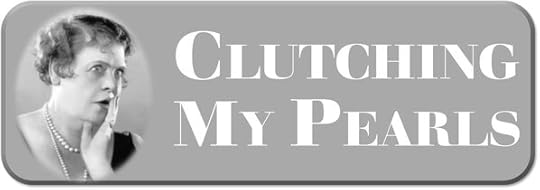 Clutching My Pearls is about Jane Austen and the times she lived in. Austen engaged with many of the same topics and issues that other novelists of the long 18th century wrote about, including the topic of female education. Click here for the first in the series. CMP#90 The Consequences of Poor Household Management
Clutching My Pearls is about Jane Austen and the times she lived in. Austen engaged with many of the same topics and issues that other novelists of the long 18th century wrote about, including the topic of female education. Click here for the first in the series. CMP#90 The Consequences of Poor Household Management 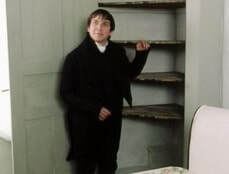 Suggested by Lady Catherine herself! I have always been struck by the passage in Mansfield Park where Fanny waits in vain for a cup of tea upon her arrival in Portsmouth: "The next opening of the door brought something more welcome: it was for the tea-things, which she had begun almost to despair of seeing that evening. [Fanny's sister] Susan and a [servant] brought in everything necessary for the meal; Susan looking, as she put the kettle on the fire and glanced at her sister, as if divided between the agreeable triumph of shewing her activity and usefulness, and the dread of being thought to demean herself by such an office.”
Suggested by Lady Catherine herself! I have always been struck by the passage in Mansfield Park where Fanny waits in vain for a cup of tea upon her arrival in Portsmouth: "The next opening of the door brought something more welcome: it was for the tea-things, which she had begun almost to despair of seeing that evening. [Fanny's sister] Susan and a [servant] brought in everything necessary for the meal; Susan looking, as she put the kettle on the fire and glanced at her sister, as if divided between the agreeable triumph of shewing her activity and usefulness, and the dread of being thought to demean herself by such an office.”Though their household is in chaos, the Prices still cling to the appearance of gentility. Pouring and serving the tea is genteel, carrying in the tray and heating the water is not. We recall as well how Mrs. Bennet is offended when Mr. Collins supposes that one of her daughters had a hand in preparing the dinner she served him. Financial disaster stalks the family if Mr. Bennet dies, but Mrs. Bennet wants the world to know that her daughters don't know how to cook. (On the other side of the coin, Austen holds Lady Catherine De Bourgh up to ridicule for her vulgar interference in the minutia of Mrs. Collins' housekeeping. Such details should be beneath her notice.)
The novels and conduct-books of the day were unanimous in agreeing that all young women should have some education in how to run a household, even if they never had to do any of the common household chores, and many warned that a genteel education which stressed accomplishments might be useful for the season of courtship, but it was a poor preparation for married life...
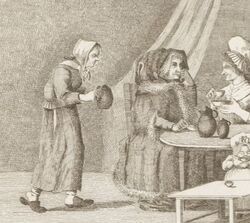 A slatternly servant brings hot water in this print (detail) by Friedrich Rottmann In The Young Woman's Guide to Virtue, Economy, and Happiness (1817), John Armstrong opines: “In the variety of female accomplishments domestic occupations are too frequently neglected, the attention being absorbed by mere ornamental accomplishments. Girls, whose families move in the higher circles of life, frequently despise family arrangements, conceiving themselves born to the envied ornaments of fashionable life… it is certainly not difficult to unite, in the female character, cultivation of talents with habits of usefulness.”
A slatternly servant brings hot water in this print (detail) by Friedrich Rottmann In The Young Woman's Guide to Virtue, Economy, and Happiness (1817), John Armstrong opines: “In the variety of female accomplishments domestic occupations are too frequently neglected, the attention being absorbed by mere ornamental accomplishments. Girls, whose families move in the higher circles of life, frequently despise family arrangements, conceiving themselves born to the envied ornaments of fashionable life… it is certainly not difficult to unite, in the female character, cultivation of talents with habits of usefulness.”The narrator in Matilda Mortimer (1809) opines, “How can the mistress of a house know how to manage her family, and see that her servants do justice by her, if she be not capable of directing them? What disorder creeps into a family, the mistress of which is ignorant of household affairs! What discontent, nay, not unfrequently, what unhappiness, it creates, between the husband and wife! How pernicious is such an example to the children!"
Major Farringdon in I’ll Consider Of It! (1812) complains that girls today are “victims of a false education, consisting only in shewy and trivial accomplishments, our women are not only half-learned, or almost ignorant, but they are utter strangers to the domestic duties, and the rearing of their own offspring..."
Ignorance could even be fatal to the children. In the final volume of Thinks I To Myself (1811), an otherwise comic novel, the author turns serious and editorializes for several pages about nursery-maids who kill their charges out of ignorance about their proper diet and care: "I cannot call my nine brothers and sisters back again... I would advise everybody else, who happens to feel any desire to have their children to live... to keep an eye on these particulars."
The heroine in Bear and Forbear (1809) was more fortunate because her mother had: “instructed her [daughter] in those accomplishments which make young women agreeable in society, [she also] taught her to be a good housewife; which is always useful, and often absolutely necessary to a young person, in whatever situation of life she may be placed.”
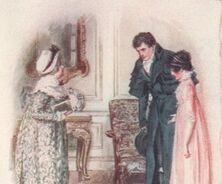 Catherine: a sad heedless young housekeeper, to be sure Housekeeping in Austen
Catherine: a sad heedless young housekeeper, to be sure Housekeeping in AustenEmma Woodhouse competently and confidently manages her father's household without any fanfare or self-congratulation. Catherine Morland's mother remarks that young “'Catherine would make a sad, heedless young housekeeper to be sure,' ...but quick was the consolation of there being nothing like practice."
Scholar Eleanor Ann Lochrie notes that “In particular, Austen dramatises the impact of badly educated mothers who abdicate responsibility for their household. In Pride and Prejudice Mrs Bennet‘s daughters are beyond her control, resulting in an impropriety of behaviour which makes the family the gossip of the neighbourhood and eventually leads to Lydia‘s downfall. In Mansfield Park the influence of loose morals and superficiality in the household can be traced to Lady Bertram‘s complete failure to exercise any kind of authority over her domain in her husband‘s absence, the consequences of which are felt by her ruined daughter at the end of the novel. The effects of defective household management may also be seen in the home of Fanny‘s parents in Portsmouth.”
The Price's household is a “scene of mismanagement and discomfort from beginning to end.” Despite Lady Bertram's insolence, Mansfield Park is well-regulated, in part because of her competent housekeeper and butler. (And, Mrs. Norris would add, because of her own vigilance over the servants.) But, as Lochrie points out, the consequences of Lady Bertram’s indolence go farther than whether tea is served on time.
When Sir Thomas goes away to Antigua, the young people put on a play featuring an unwed mother (played by Maria) and a pert and forward coquette (played by Mary Crawford). Fanny is shocked by the play, thinking it entirely improper, but Lady Bertram is too indolent to take the least notice when Maria and Henry Crawford are brought into a "dangerous intimacy" by rehearsing together.
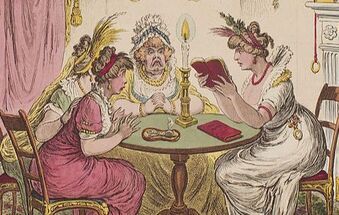 Reading trashy novels in "Tales of Wonder" (detail) Gillray I've come across a novel which used the same plot device that Austen used in Mansfield Park--a husband's extended absence in the West Indies--to bring about the crisis.
Reading trashy novels in "Tales of Wonder" (detail) Gillray I've come across a novel which used the same plot device that Austen used in Mansfield Park--a husband's extended absence in the West Indies--to bring about the crisis.In A Tale of Warning, or the Victims of Indolence (1810), the main character, Agatha, doesn't bother to manage her own household, just like Lady Bertram. Her husband goes away to the West Indies on military duty. Agatha’s nursery-maid takes her little boy away to live with her. “Agatha, who from a child had never taken the trouble to think or decide for herself, [shades of Lady Bertram!] suffered Nanny, as usual, to direct her...” She lounges about the house reading novels.
When Agatha’s husband returns, “after suffering hardships and dangers innumerable” he is very upset, of course. “So, it is for trash like this, that your Archibald is abandoned! Instead of reading moral books, that would teach you your duty, or such as would store your mind with useful knowledge, you deprave your understanding with pernicious works, without the shadow of merit or originality, which shut your heart against true feeling...” Just then, a servant brings the tragic news that little Archibald, who was poorly supervised, has fallen out of a window and died.
A Tale of Warning was a novel for young people, so the message is laid on thickly. Austen's touch, thankfully, is more humorous and subtle but the explosion of Maria Rushworth's marriage has serious and lifelong consequences for her and her family, and Austen makes it clear her tragedy has its roots in the lack of guidance she received in her youth. I am not suggesting that Austen borrowed the idea of bad consequences arising out of the husband's trip to the West Indies from A Tale of Warning. Novelists of this time frequently sent their characters to the West Indies or India to get them out of the way for plot purposes, and in this case, the plot purpose just happened to be similar.
Agatha's husband goes to the West Indies because he is a soldier. While there, he helps out a plantation-owner in danger of bankruptcy, and this is given as an example of his (the husband's) decency and good character. Austen is less specific about what Sir Thomas does in Antigua but it has to do with sorting out business affairs. Although all her references to Sir Thomas’s trip to Antigua have to do with the dangers and hardships that he undergoes, with no reference to whether he has enslaved humans, modern interpreters of the novel argue that the references to Antigua must surely be anti-slavery references, a question I took up last year.
Today, of course, modern readers question what the fuss over "Lover's Vows" is about, although Austen expresses Edmund and Fanny’s objections clearly and at some length. Podcasters Kristin and Maggie discuss the importance of the play in Mansfield Park in this episode of the First Impressions podcast. Lochrie, Eleanor Ann. Debates on female education: constructing the middle ground in eighteenth century women's magazines and the novels of Fanny Burney and Jane Austen. Diss. University of Strathclyde, 2010. "Austen‘s most overt comments on the effects of education, in both men and women, come in Mansfield Park.”
Published on February 28, 2022 00:00
February 21, 2022
CMP#89 Education for Your Station in Life
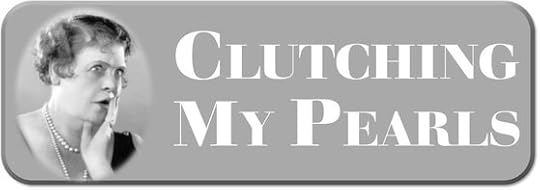 “Here is another one for you, Price: causa latet, vis est notissima— ‘the cause is hidden, but the result is well known’. You are learning Latin, you told me, to converse with your brother officers, but perhaps there is another reason—perhaps, you wish to impress a certain uncle, who is father to a certain young lady…..”
“Here is another one for you, Price: causa latet, vis est notissima— ‘the cause is hidden, but the result is well known’. You are learning Latin, you told me, to converse with your brother officers, but perhaps there is another reason—perhaps, you wish to impress a certain uncle, who is father to a certain young lady…..”William Price grinned. “It’s like that fellow you told me about—that fellow who wrote War in Disguise. He knew that people can have more than one motive for doing a thing.”
“Mr. Stephen. Yes. Clever fox—he saw that Parliament could not be persuaded to outlaw the trade in slaves for moral reasons. So, he made the French slave trade a casus belli, if you will--
“A casus bell-eye?”
“Look it up in your grammar, Mr. Price."
-- Fanny's brother trying to get a classical education from his friend in A Contrary Wind CMP#89 "Our Elegant Girls Must Be Either Useful or Starve"
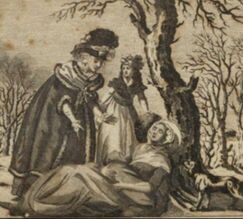 Mrs. Leyster rescues a destitute widow In the previous posts we’ve been looking at education in Mansfield Park and in Austen’s era. The debates about education I’ve been looking at center on the appropriate education for the gentry, but of course this educated, literate class comprised only a small percentage of the population of the United Kingdom. Scholar Amy J. Lloyd says that “In 1800 around 40 percent of males and 60 percent of females in England and Wales were illiterate.” While crusaders such as Hannah More felt that basic literacy was an essential precursor to understanding the tenets of Christianity, others felt that teaching the labouring classes to read was just asking for trouble.
Mrs. Leyster rescues a destitute widow In the previous posts we’ve been looking at education in Mansfield Park and in Austen’s era. The debates about education I’ve been looking at center on the appropriate education for the gentry, but of course this educated, literate class comprised only a small percentage of the population of the United Kingdom. Scholar Amy J. Lloyd says that “In 1800 around 40 percent of males and 60 percent of females in England and Wales were illiterate.” While crusaders such as Hannah More felt that basic literacy was an essential precursor to understanding the tenets of Christianity, others felt that teaching the labouring classes to read was just asking for trouble.In The Two Cousins (1798), the benevolent Mrs. Leyster takes in a destitute widow and her baby. Mrs. Leyster’s young daughter Constance asks if she can help raise and educate Jenny, the little baby.
“But tell me, my child,” [asks Mrs. Leyster] “What do you intend to teach her?”
“I will teach her, mama, as soon as she can learn, to read, to spell, and to [do needle]work, afterwards she shall learn to write, and I will instruct her in drawing and dancing.”
“Very well,” said Mrs. Leyster, “then I suppose you will finish by giving her a good fortune."
When little Constance, surprised, protests that she can't do that, her mother explains that the sort of education Constance proposes will render Jenny unfit for the station in life in which Providence placed her... “For common servants, in my opinion it is quite sufficient if they are taught their duty to God and man, and to read it in the Holy Scriptures. For them, especially for women servants, I disapprove of learning to write. My experience has hitherto taught me, that those who are instructed in that branch of learning more frequently become idle scribblers, prying and curious into the affairs of others, than useful and active servants… however, many wise and good people have thought otherwise.”
Mrs. Leyster calibrates Jenny’s future position in the social hierarchy with exactitude: she will not “be reduced to the condition of a lower servant,” so it’s all right if she learns to read, write, do sums and learn plain needlework. “And she shall be instructed by Martha in confectionary and pastry. I will also have her know how to assist in cooking, in cleaning fine linen, and even doing the less laborious work of the house…”
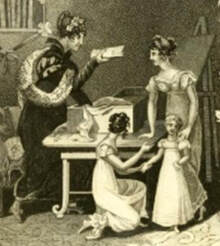 Fatherless Fanny is denied an education Jenny’s father was a journeyman carpenter, so everyone knows which social class she comes from. The social status of a foundling is more perplexing. In A Winter in London (1806) Amelia Dickens fosters a little foundling boy who survived a shipwreck in which everyone else perished. She knows it would be wrong to raise him in the nursery with her own children. “It would certainly be an act of injustice and folly to bring up the child upon an equality with our own children, when their future prospects in life are so different: --they, born to the first fortunes in the kingdom; and he, poor fellow! the heir to nothing but what nature bestows upon all her sons.”
Fatherless Fanny is denied an education Jenny’s father was a journeyman carpenter, so everyone knows which social class she comes from. The social status of a foundling is more perplexing. In A Winter in London (1806) Amelia Dickens fosters a little foundling boy who survived a shipwreck in which everyone else perished. She knows it would be wrong to raise him in the nursery with her own children. “It would certainly be an act of injustice and folly to bring up the child upon an equality with our own children, when their future prospects in life are so different: --they, born to the first fortunes in the kingdom; and he, poor fellow! the heir to nothing but what nature bestows upon all her sons.”In the best-selling Fatherless Fanny, a little girl is left at a boarding school with no information about her relatives and a note for 200 pounds. After the money runs out, the headmistress stops her music and drawing lessons and threatens to send her to the workhouse. Of course her true parentage is revealed in the end.
The same question confronts Mrs. Barnet in Edward: Various views of human nature, taken from life and manners, chiefly in England (1798). She sends clever young Edward to the local grammar school, but what should he be trained for? Mr. Barnet’s friend Mr. Temple tricks Mr. Barnet into sending Edward to study law by urging against it: “The world [will] laugh at the folly of giving a boy an education that would fit him for one of the learned professions, when you intend to breed him a tradesman… I hope at least you will not think of the law… because the world would blame you very much.”
“The world may go and be d----d,” answers Mr. Barnet. “Am I to mind its fancies?” He impulsively resolves that Edward “shall be sent to one of the best schools in England, there to learn as much Latin as I please…ay, and Greek too if I think proper, and you may make my compliments to the World.”
The dilemma faced by the Barnets is not so different from Sir Thomas Bertram’s caution in respect of his niece Fanny Price. “There will be some difficulty in our way… as to the distinction proper to be made between the girls as they grow up: how to preserve in the minds of my daughters the consciousness of what they are, without making them think too lowly of their cousin; and how, without depressing her spirits too far, to make her remember that she is not a Miss Bertram." Once she has a genteel education, Fanny will not be able to return to her old life--as indeed she discovers. Like Mrs. Leyster, Sir Thomas believes that if he educates Fanny to be a gentlewoman, he is morally obliged to "secure to [her] ... the provision of a gentlewoman."
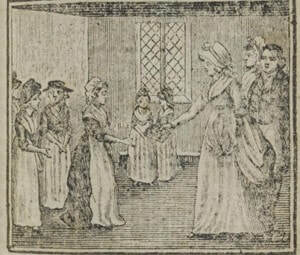 Gentlewoman visiting a village charity school
Cautionary Tales
Gentlewoman visiting a village charity school
Cautionary Tales
The novels and conduct books of the day include cautionary tales about parents of the lower or middling classes who gave their children an education--and therefore expectations--which made them dissatisfied with their station in life.
In I’ll Consider Of It! (1812), Major Farringdon thinks Mrs. Clarkson should remember that she is merely the daughter of a soldier, although she has won the lottery. Therefore, she should not over-educate her daughter. “Pardon me, the world, especially the great world, will still remember your former situation, and many will even think, that Miss Clarkson is already too accomplished for a young lady of her fortune.”
“But I have very great views for my daughter;” Mrs. Clarkson protests, “these I shall at present keep entirely to myself, and a governess she certainly must have…”
Fanny Belton’s father, a poor curate, gives her a classical education in The Woman of Letters (1783). After he dies, she saves a few of “the best Greek and Latin authors” from his library while the rest is sold off. Her father’s friend writes: “I pray to heaven her turn for literature may be of use to her—but I fear the contrary. My wife… a plain good woman, often says, she wishes Fanny had been bred to her needle rather than to her pen, as by the former, she might have been enabled to have acquired a genteel livelihood.”
In The Young Woman's Guide to Virtue, Economy, and Happiness (1817), John Armstrong opines that: "those belonging to the lower orders of middling life" should avoid the "high and polished branches of education, which are utterly inconsistent with the circumstances of their families. This error... has become very general, and is productive of much human misery."
In contrast, some girls escape this fate in Coraly (1819). The heroine admires the demeanor of some village girls attending a village fête hosted by the local baronet. He agrees: “Those neat and good girls were great favourites of my aunt’s, and she taught them several useful things herself. How much more respectable they look in those neat brown gowns, and pretty little caps, than some of the others, whose mistaken parents have ruined their happiness, corrupted their taste, and made them discontented, by putting them to what is called a lady’s school.”
Even Mary Wollstonecraft, in her Thoughts on the Education of Daughters (1788), warns parents of modest means to guard against "going on in thoughtless extravagance, and anxious only that their daughters may be genteelly educated... consider to what sorrows they expose them.” An example is given In Douglas, or the Highlander (1800), when a greengrocer’s daughter rejects marriage to a tradesman but lives to regret it: “Her parents… were inferior trades-people, whose foolish vanity had prompted them to send [their daughter] to a boarding-school; there she had learned nothing that could be useful in her station, and many things that must be hurtful in any station; that her fancy had been dazzled by the novels which the young ladies were allowed to read, and she hoped to meet with as extraordinary good fortune as befell the heroines of those novels, many of whom, though brought up to no manner of useful employment.... by discovery of some new relation, by the death of some twentieth cousin, quickly came to a great fortune, or by their beauty and accomplishments , got a great match….” The narrative switches to first person as the girl says “I thought myself not without beauty; heard from my governess and teachers that the way to be accomplished was to read French, play music, dance, and sing Italian airs… When I returned from school, I found, alas! my accomplishments… were of no use in helping to my mother to serve in the shop.
"Tom Chink, the pewterer, used to tell me I was a likely lass, and actually made his addresses to me. My parents told me I could not do better, for that Tom was a thriving man. No, no, said I, if you had intended me for a tradesman you should not have made me a BOARDING-SCHOOL YOUNG LADY. I never read, in any novel, of any of the heroines throwing themselves away upon a mechanic.”
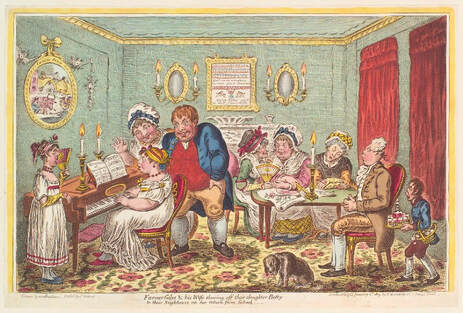 'Farmer Giles and his wife shewing off their daughter Betty to their neighbours, on her return from school' by James Gillray, published by Hannah Humphrey, hand-coloured etching, 1809, National Portrait Gallery The girl is then seduced by a handsome soldier and “I soon fell a victim, less to his designs than to my own foolish vanity; the consequences of the foolish vanity of my parents… I have learned that not a few owe their ruin to the same cause.”
'Farmer Giles and his wife shewing off their daughter Betty to their neighbours, on her return from school' by James Gillray, published by Hannah Humphrey, hand-coloured etching, 1809, National Portrait Gallery The girl is then seduced by a handsome soldier and “I soon fell a victim, less to his designs than to my own foolish vanity; the consequences of the foolish vanity of my parents… I have learned that not a few owe their ruin to the same cause.”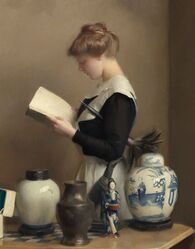 The House Maid, William McGregor Paxton
A Threat to the Social Fabric
The House Maid, William McGregor Paxton
A Threat to the Social Fabric
Over-education, as we have seen, was thought to be a bad idea for working-class girls. It was also seen as weakening society as a whole.
The narrator in The Advantages of Education warns: “Suppose for one instant that the rage for idleness (I beg pardon, I mean refinement; I always mistake those words) should spread to the next order in society, and our housemaids and cooks, weary of their dirty occupations, should grow as refined as their young ladies. The industrious mother cannot perform all the domestic affairs herself, and as we do not live in Utopia, but in a country, where exertion must precede enjoyment, our elegant girls must either be useful or starve."
As we've seen, Sir Thomas understood that if he took his niece Fanny into his household, he would be changing her life forever because he would be changing her social class.
"Sir Thomas himself was... proud of his niece; and without attributing all her personal beauty, as Mrs. Norris seemed to do, to her transplantation to Mansfield, he was pleased with himself for having supplied everything else: education and manners she owed to him."
As Mansfield Park ends, the same favour will be conferred upon Fanny's younger sister Susan. Education, Literacy and the Reading Public , by Amy J. Lloyd, Gale Primary Sources (pdf) Clutching My Pearls is about Jane Austen and the times she lived in. The opinions are mine, but I don't claim originality. Much has been written about Austen. Click here for the first in the series.
Published on February 21, 2022 00:00



